Surgeons in Stepnogorsk Forced to Operate in Regular Wards Amid Years-Long Renovation Delays
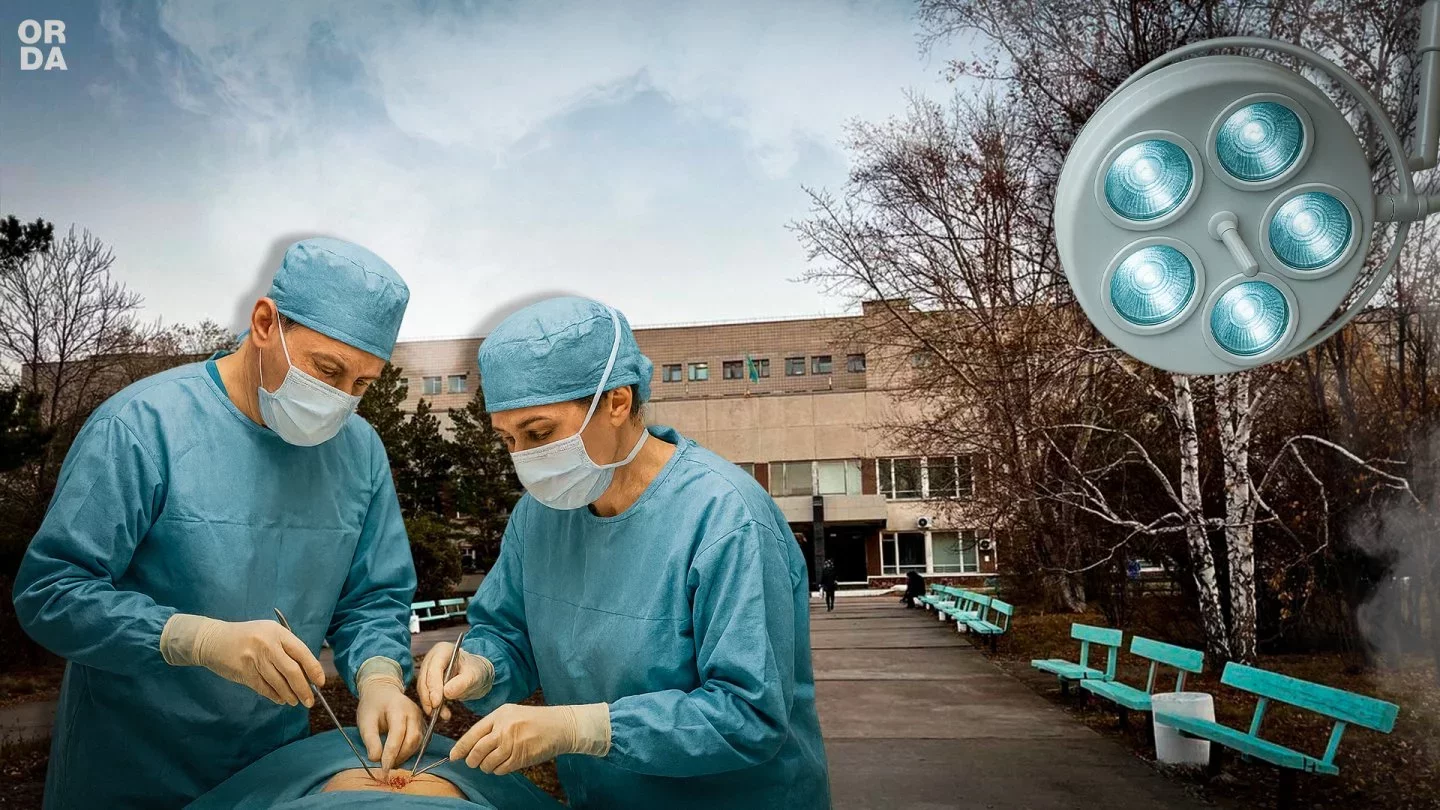 Photo: Orda.kz
Photo: Orda.kz
Surgeons at the Stepnogorsk Multidisciplinary City Hospital have been performing surgeries in ordinary wards for nearly two years. What was meant to be a temporary measure during a major renovation has turned into a long-term workaround.
The delay, coupled with poor quality of the work, has raised serious safety concerns — the hospital leadership believes the unfinished operating rooms pose risks to patients’ health and lives. Residents, meanwhile, are asking why the administration allowed the situation to reach this point.
Orda.kz visited the facility and saw everything firsthand.
What the Building Looks Like
Locals call the facility simply “the seven-story hospital.” The complex consists of several large blocks connected by underground corridors.
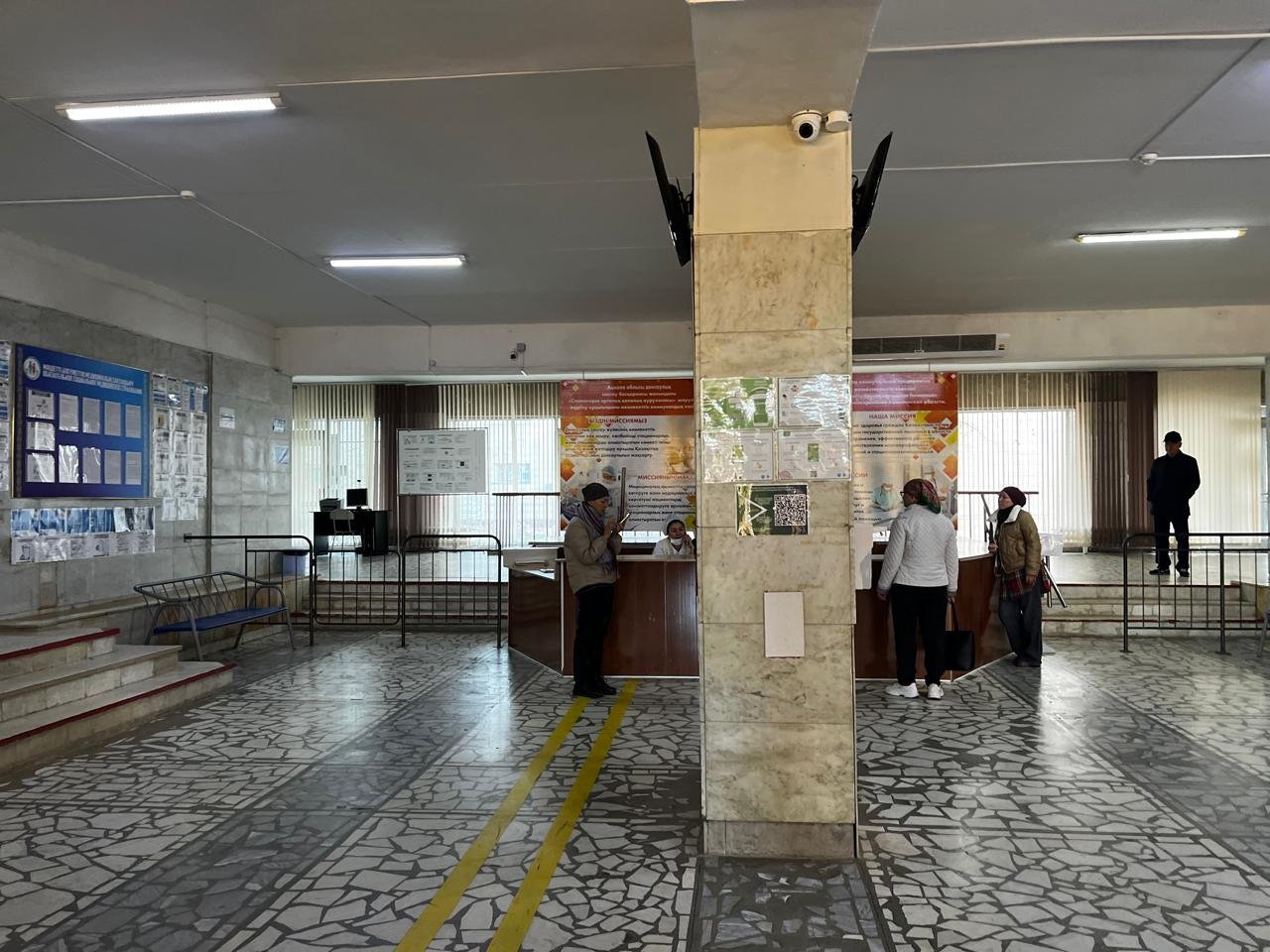
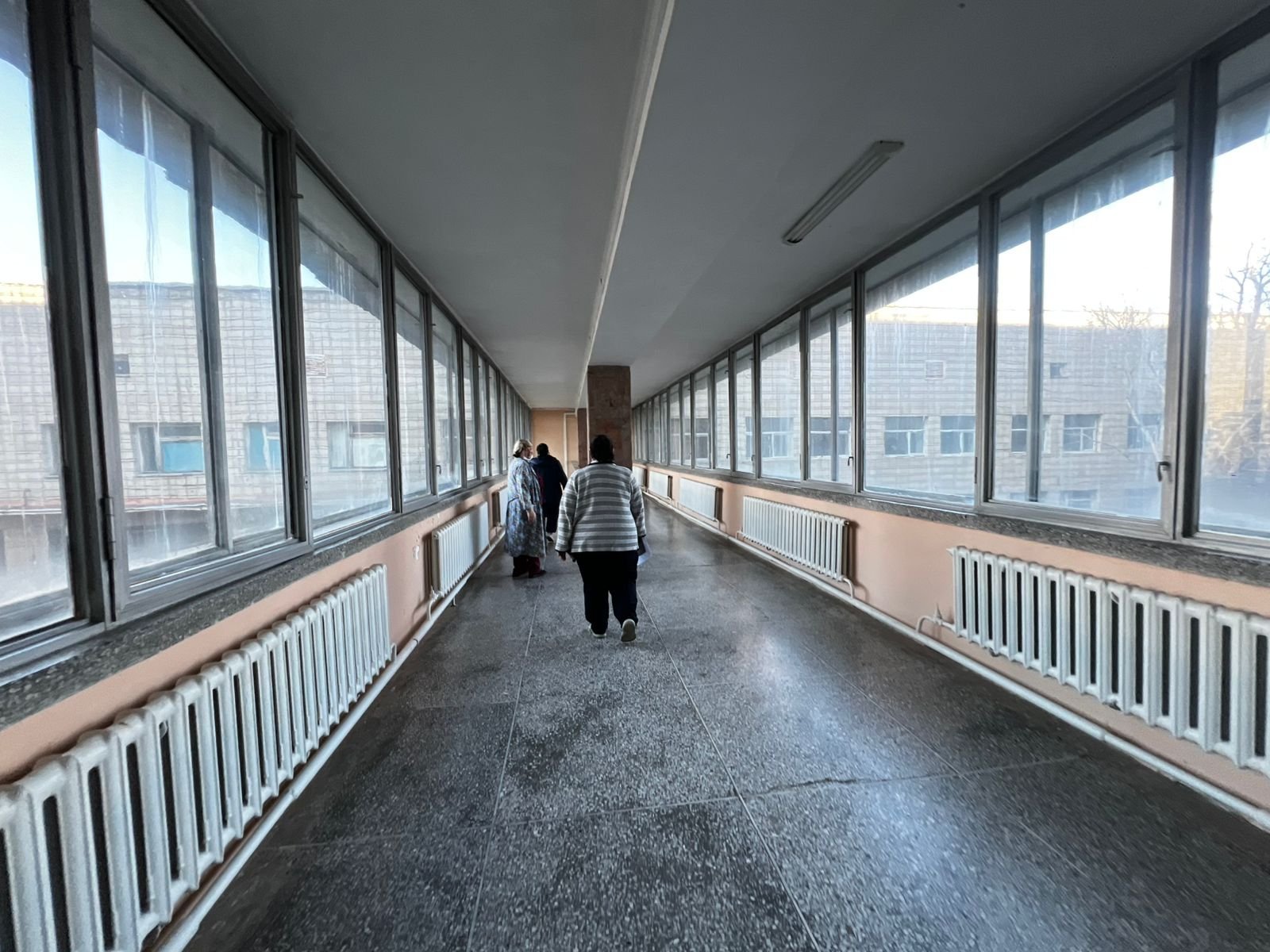
Walking inside feels like stepping into a Soviet film set — towering ceilings, massive columns, spacious halls, and wide corridors. The building’s grand, monumental architecture reflects an era when things were built to last, with every detail designed for efficiency and large-scale service.
The Stepnogorsk hospital looks nothing like most medical facilities in Kazakhstan — and for good reason. It was built according to a standard Moscow design, later adapted for local conditions. In fact, the entire city was once a “mini-Moscow,” with grand buildings, straight avenues, and leafy courtyards.
Stepnogorsk used to be a closed scientific and industrial center, home to defense and nuclear enterprises. Funding, staff, and equipment all came directly from Moscow through the Soviet ministries.
How Financial Problems Affect Staff and Patients
The hospital was built in 1984 and has never undergone major reconstruction. Its “vintage” state is only one of the hospital’s problems. The other is financial: the hospital debt now stands at 740 million tenge.
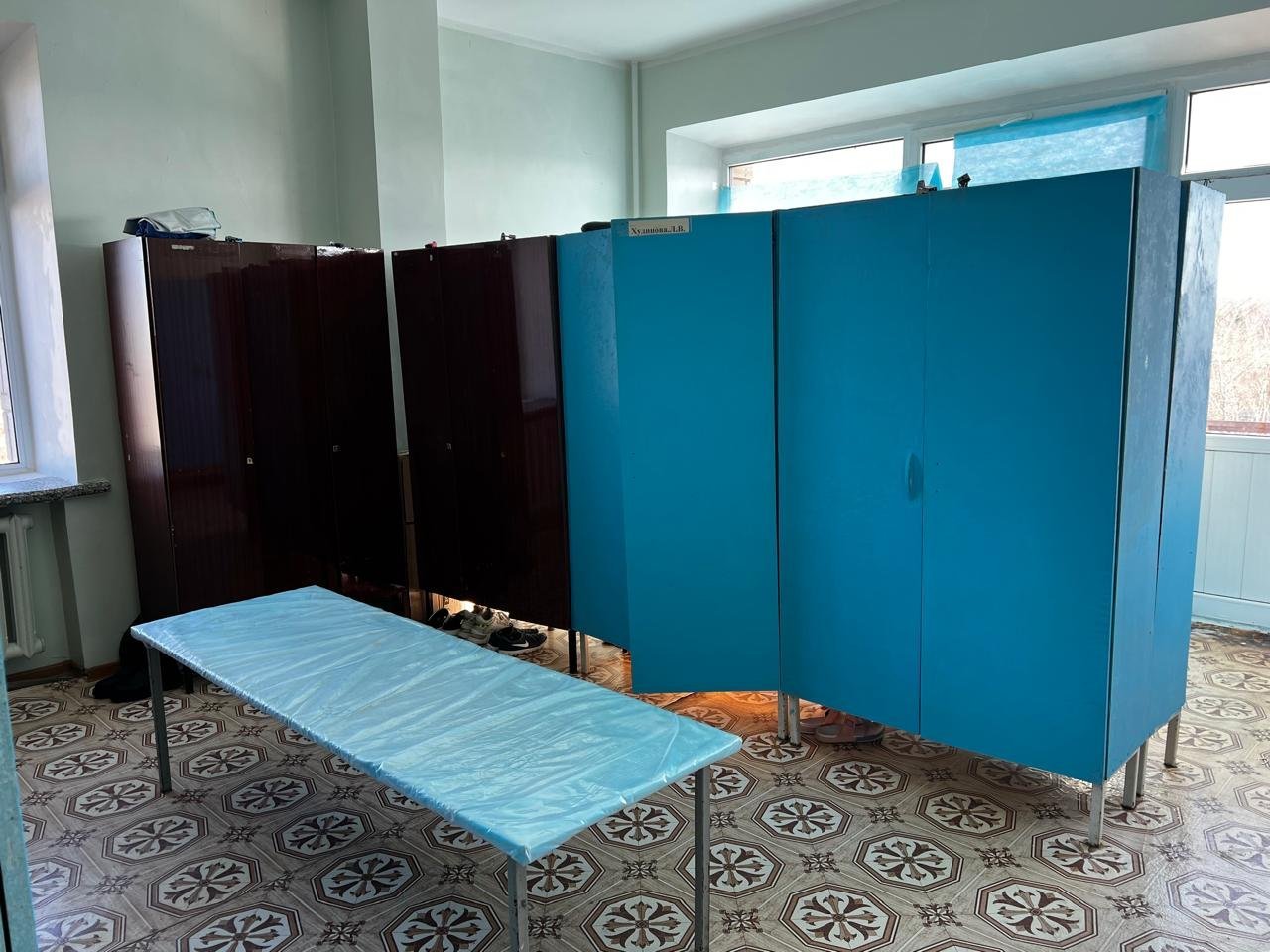
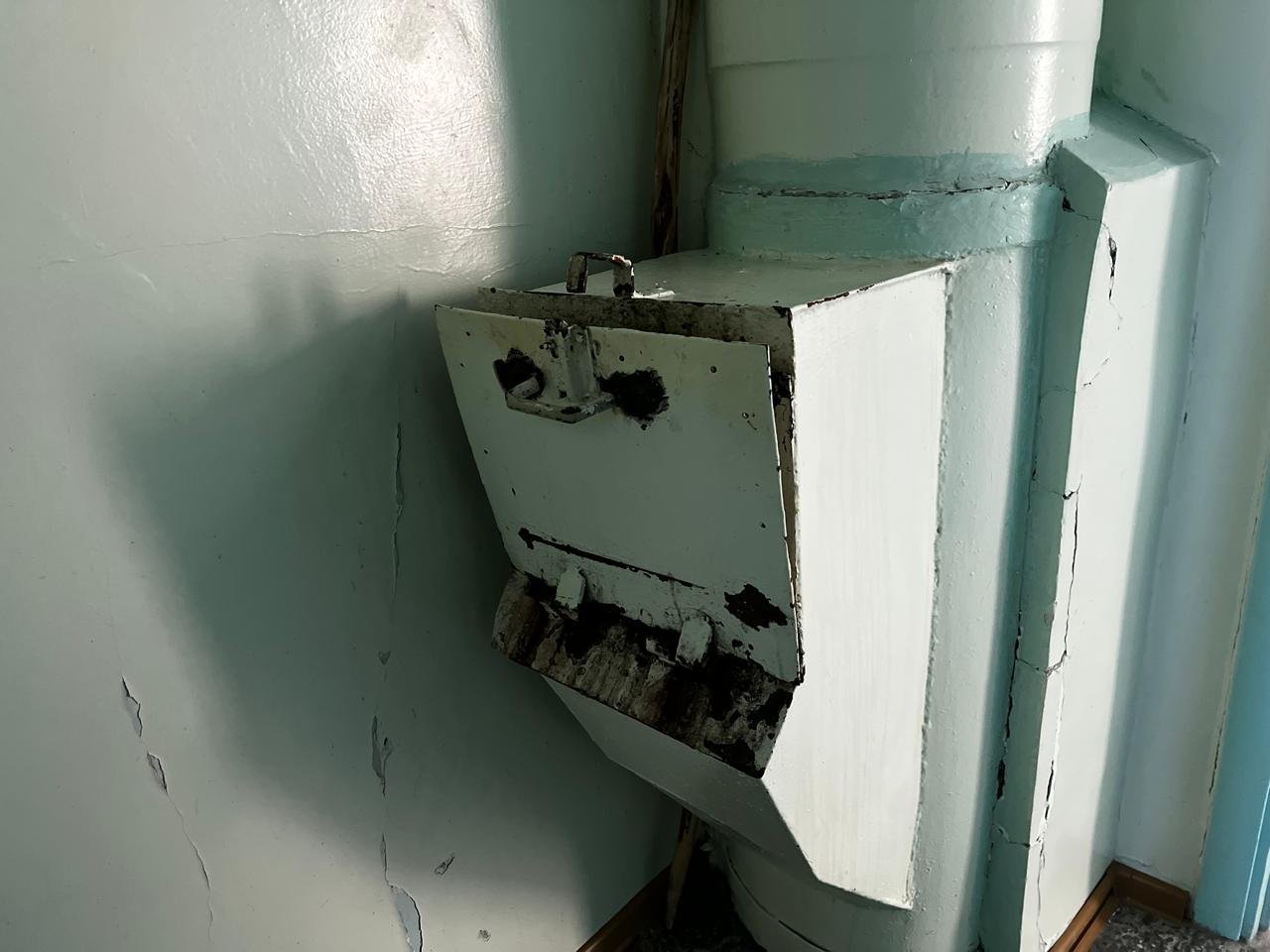
Due to its dire financial condition, the accounting office seems to save money on people. Medical workers complain about frequent salary delays and underpayments. Overtime and bonuses are often removed.
There are also disruptions in pension and insurance contributions, causing doctors and nurses to face difficulties accessing medical services themselves.
We don’t get our salaries on time, and they’re always short. Pension contributions have only just started again, and the health insurance payments were only recently made — before that, nothing. You try to work honestly, but there’s no confidence in fair pay or social protection, staff members said.
Training for specialists has also stalled due to unpaid expenses. As a result, a neurosurgeon, for example, is forced to work with an expired certificate.
The accounting department has faced its own mishaps: last year, a cleaner was accidentally paid one million tenge, which was immediately seized by the bank to cover her debts. Another curious incident happened right before March 8: someone posted a picture of an angry cat on the accounting office door with the caption, “Where’s the money?!”
Meanwhile, part of the massive building is occupied by a medical college and a private clinic, though the clinic reportedly pays only for utilities.
Inside the Hospital Units
The hospital’s wards tell the story of hard times most clearly. Let’s take the surgery unit as an example.
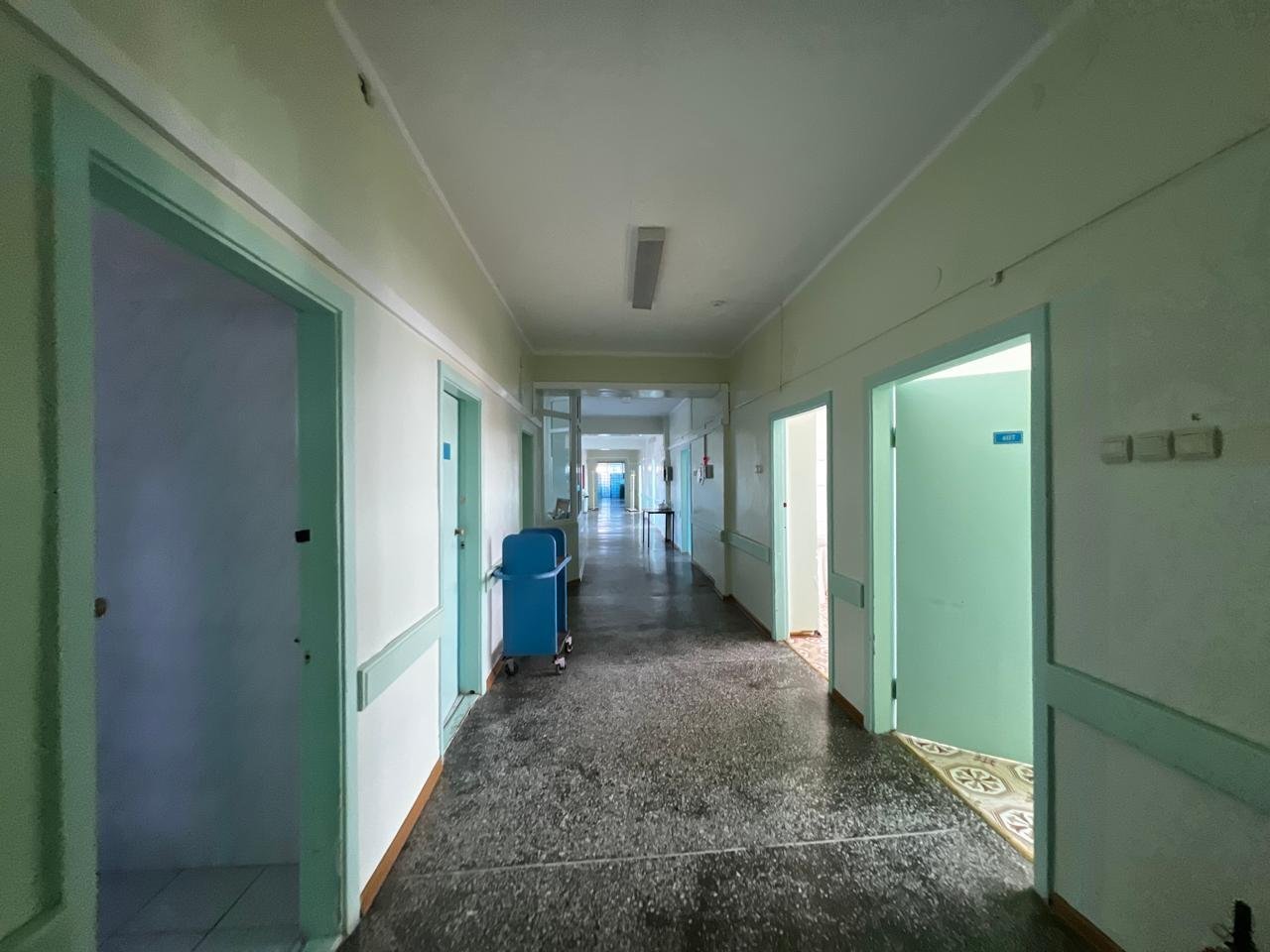
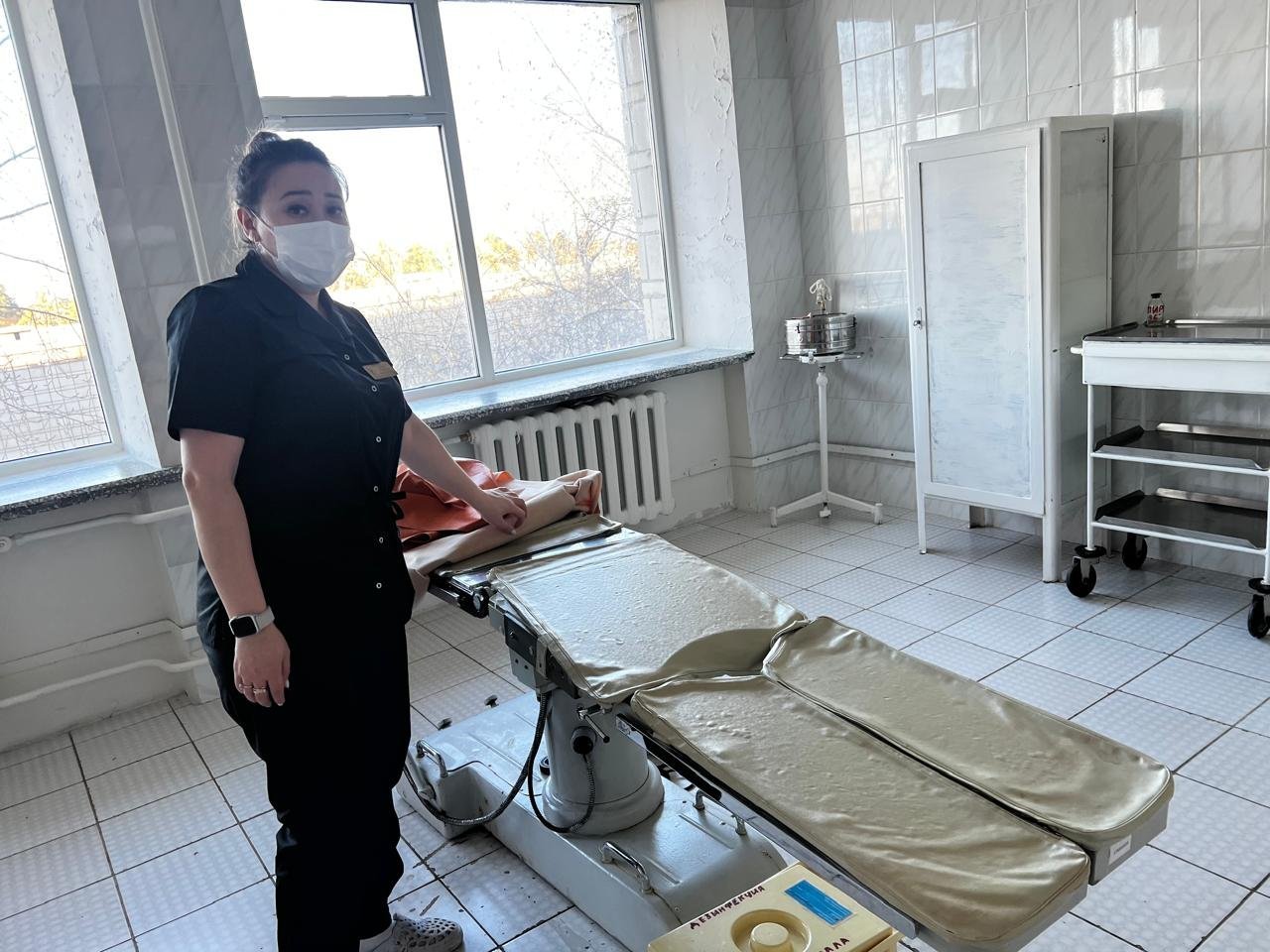
When asked to show what was old and needed replacing, one doctor hesitated:
"Everything here is old," she said.
In the procedure room, an old, broken operating table sits under a rubber sheet. Nurses use metal sterilization boxes that look like relics. The walls are chipped, doors have been repainted countless times, and windows are covered not with blinds but with medical sheets.
The furniture is worn and mismatched — sagging beds, rickety tables, and rotting bedside cabinets.
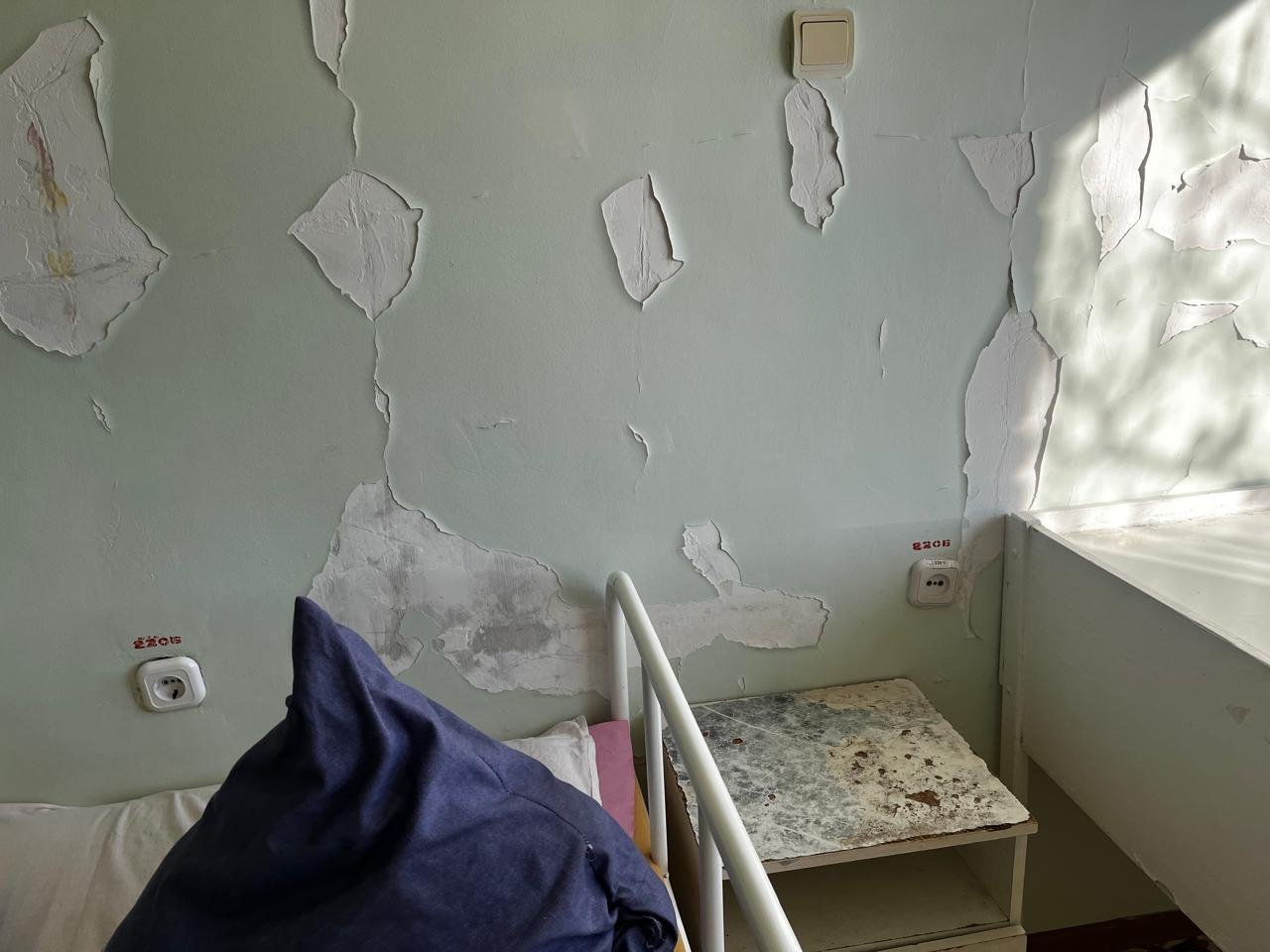
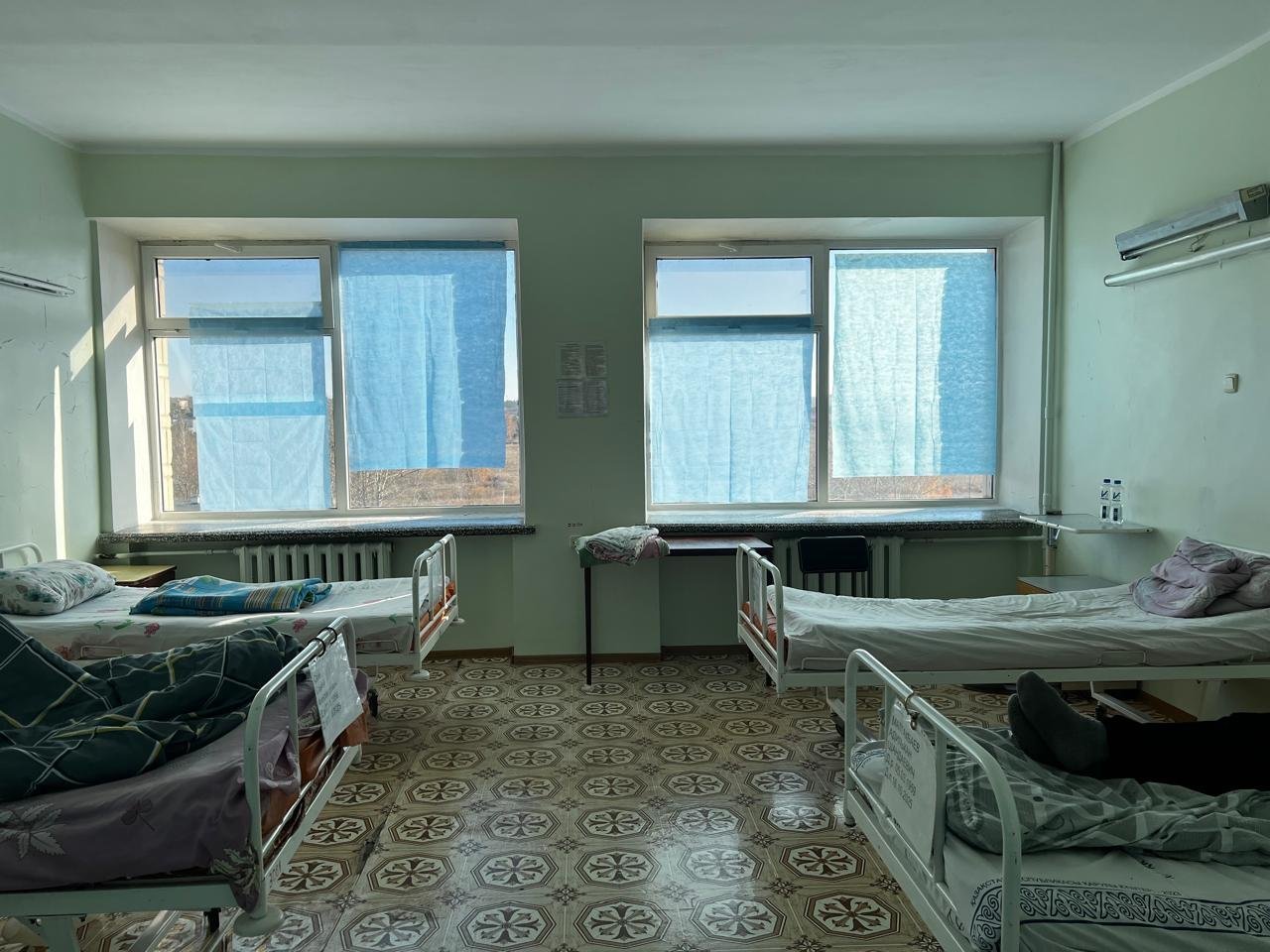
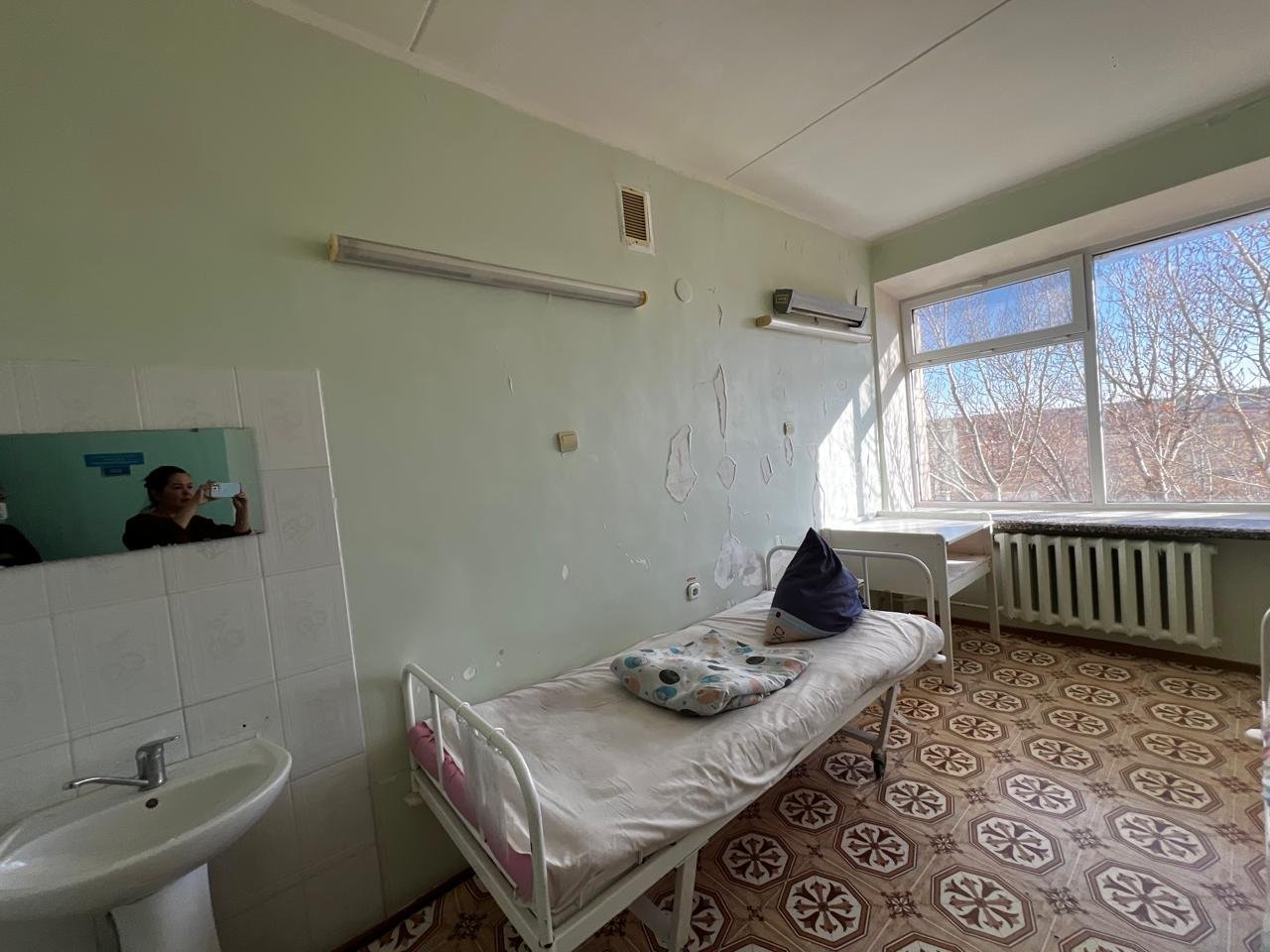
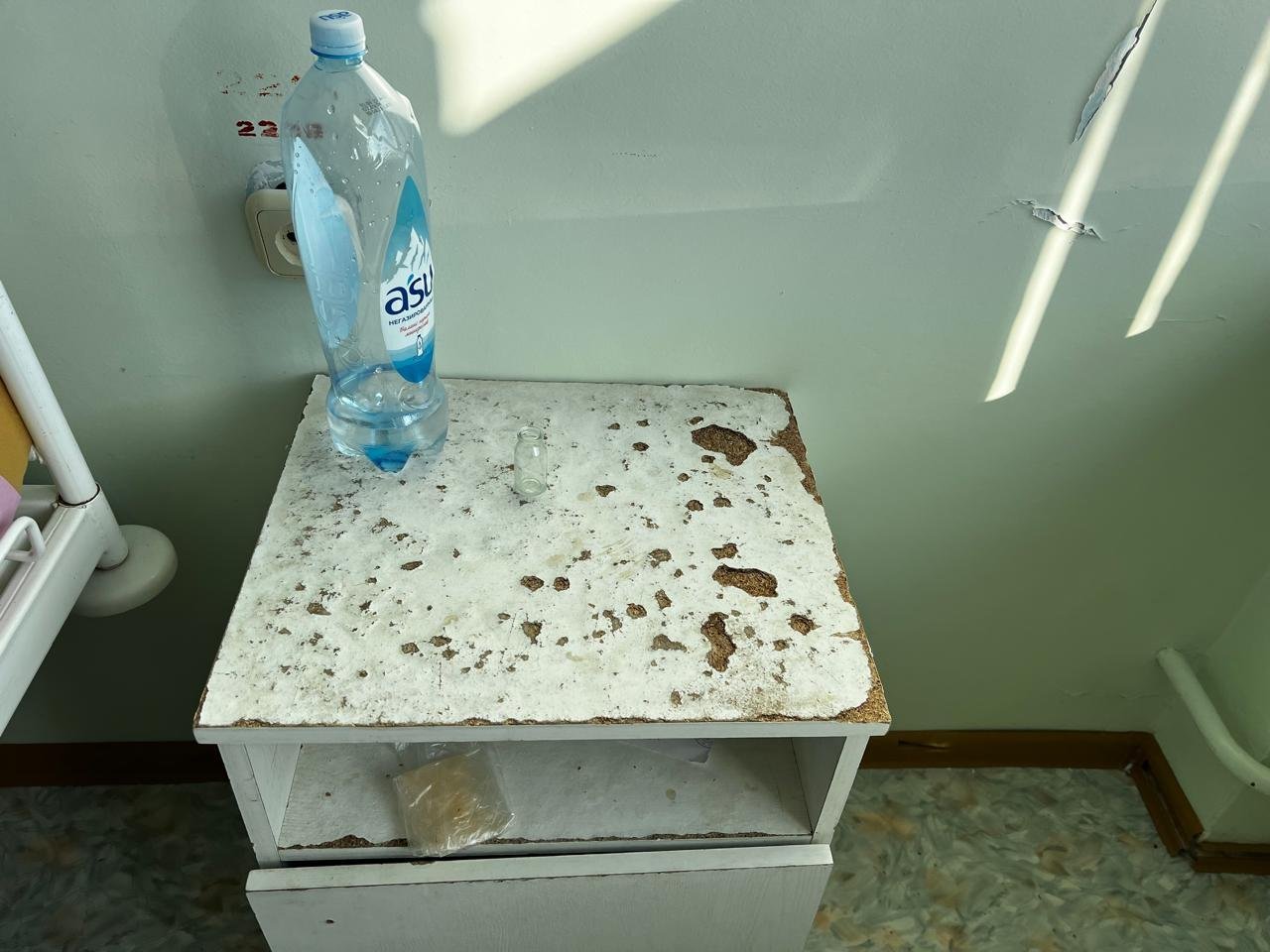
The reporter remarked that only a prison cell could be more depressing than these wards — to which a staff member replied, “We have one.”
Indeed, the hospital includes a small ward for prisoners, as two correctional colonies are located nearby. It consists of two small rooms: one for guards and one for patients, with a camera feed to a monitor.
Medical staff say the partition should be covered with a proper material, not a hospital sheet. The room itself looks even gloomier.
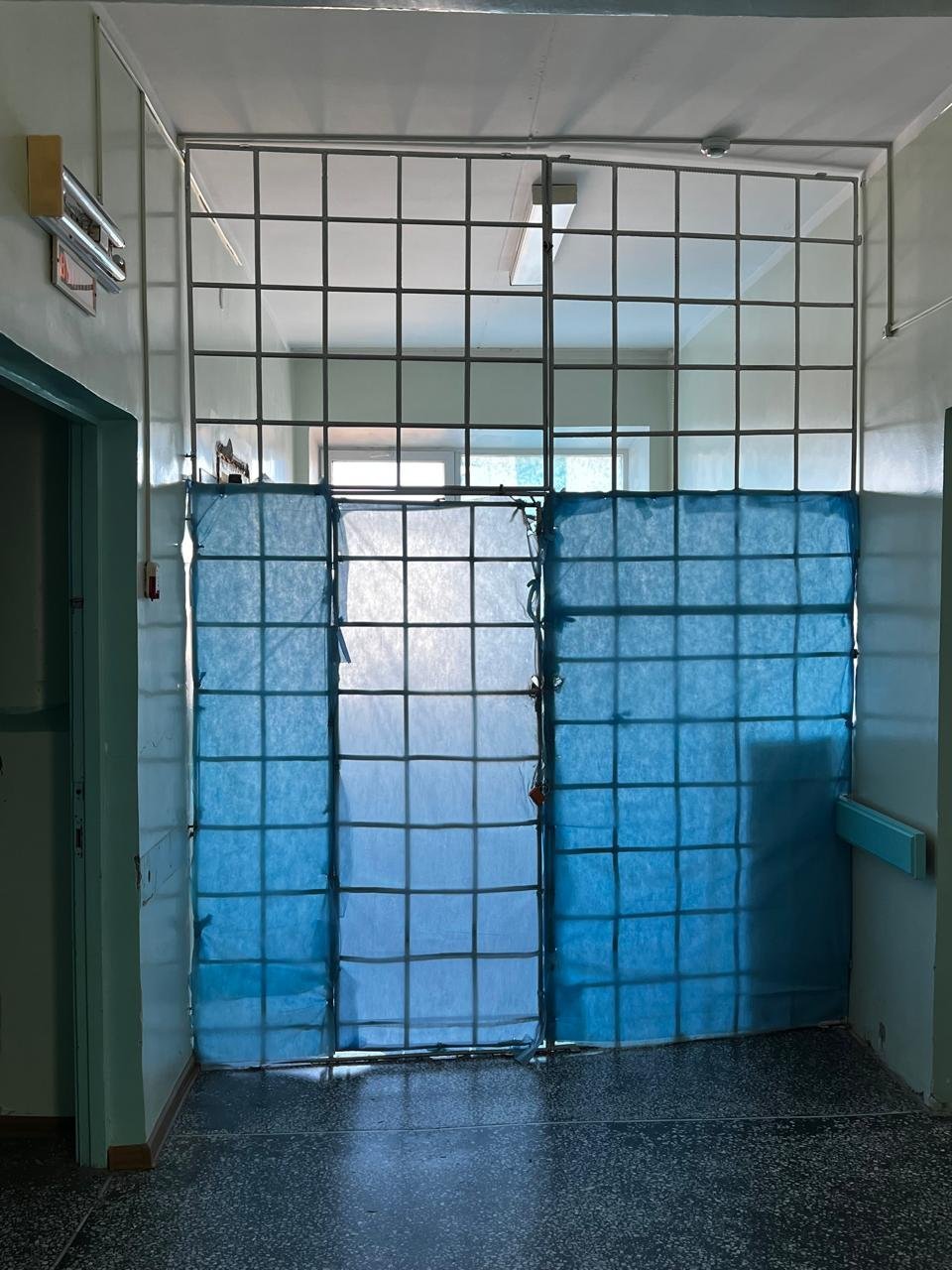
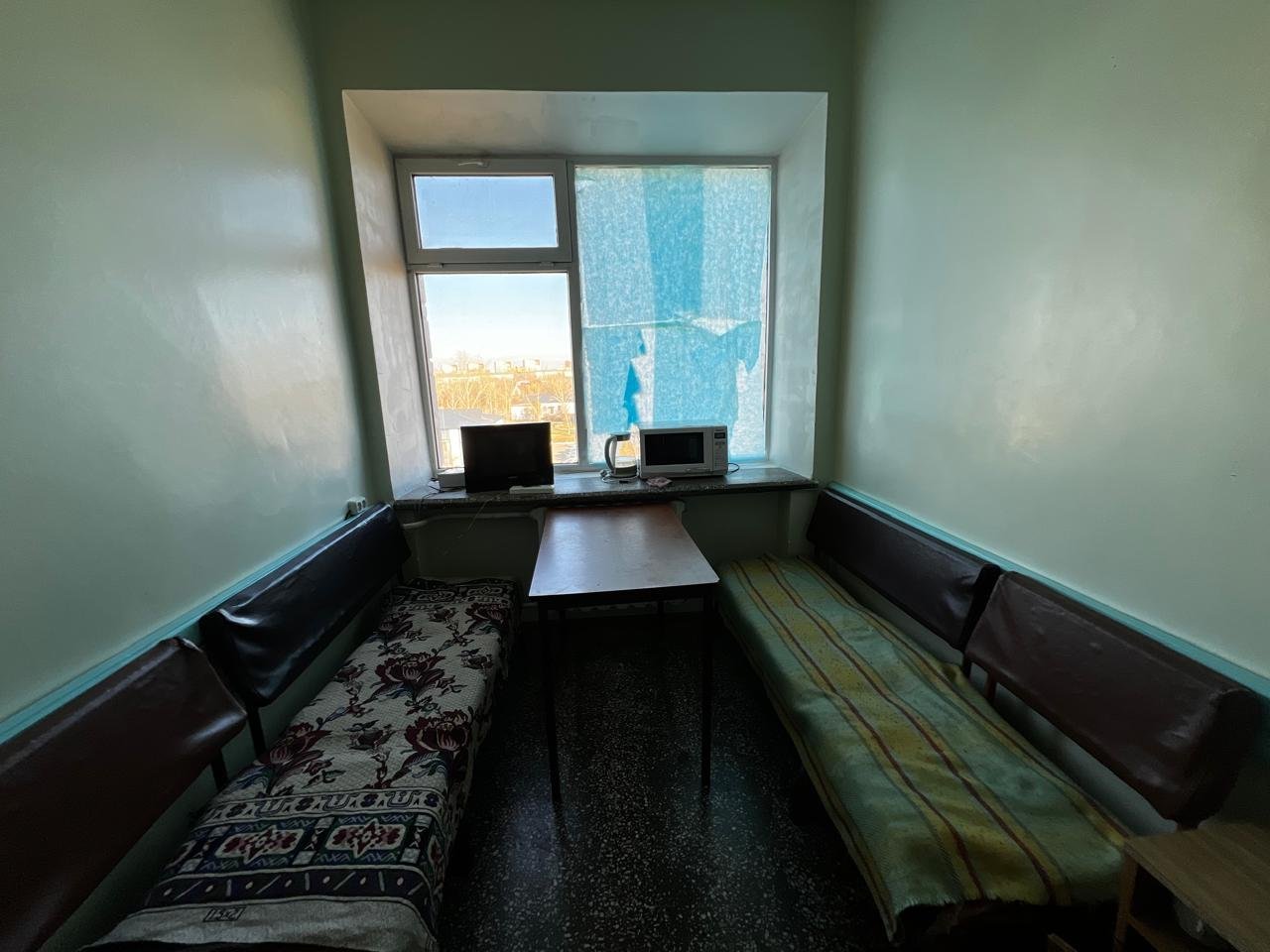
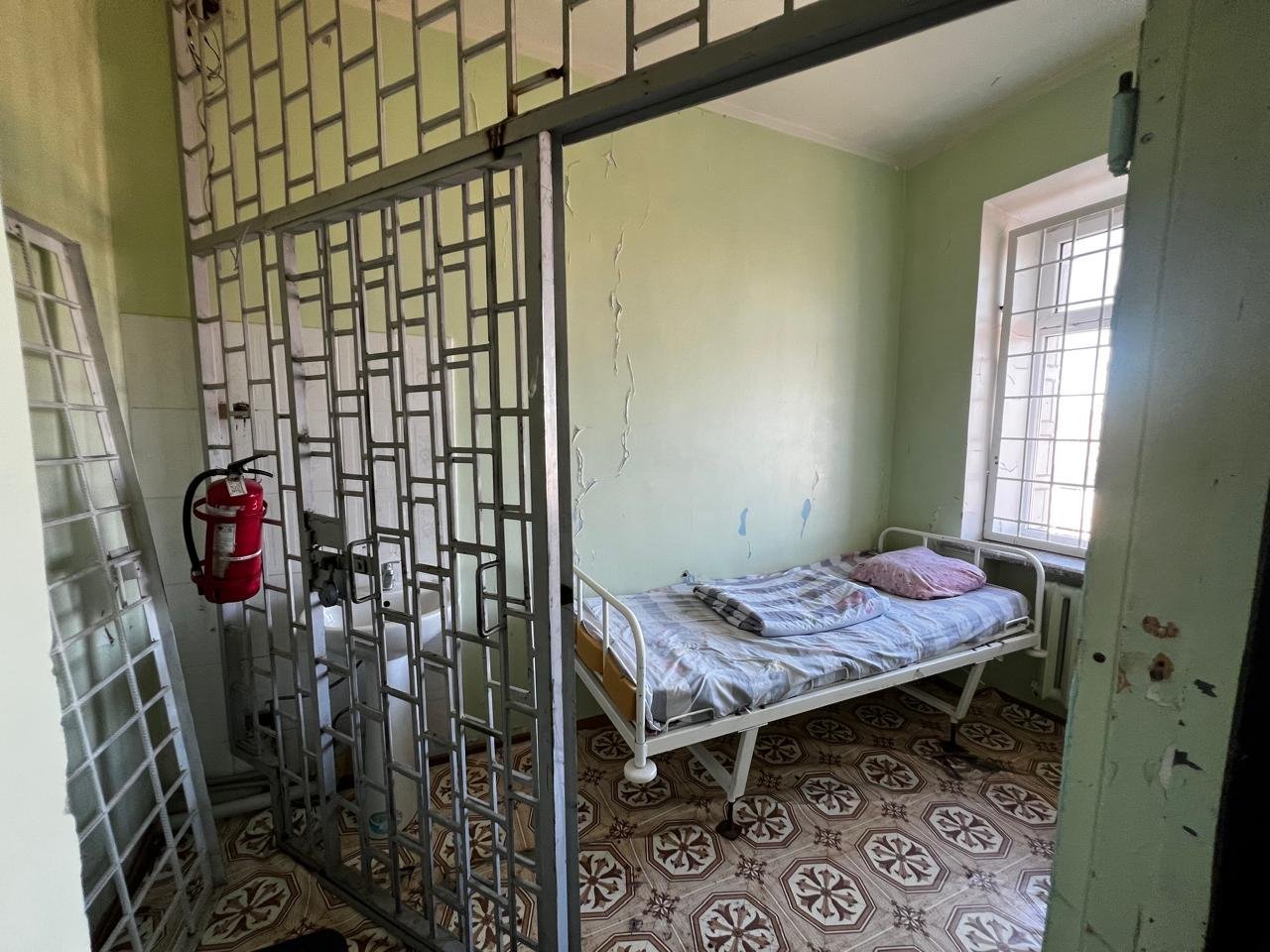
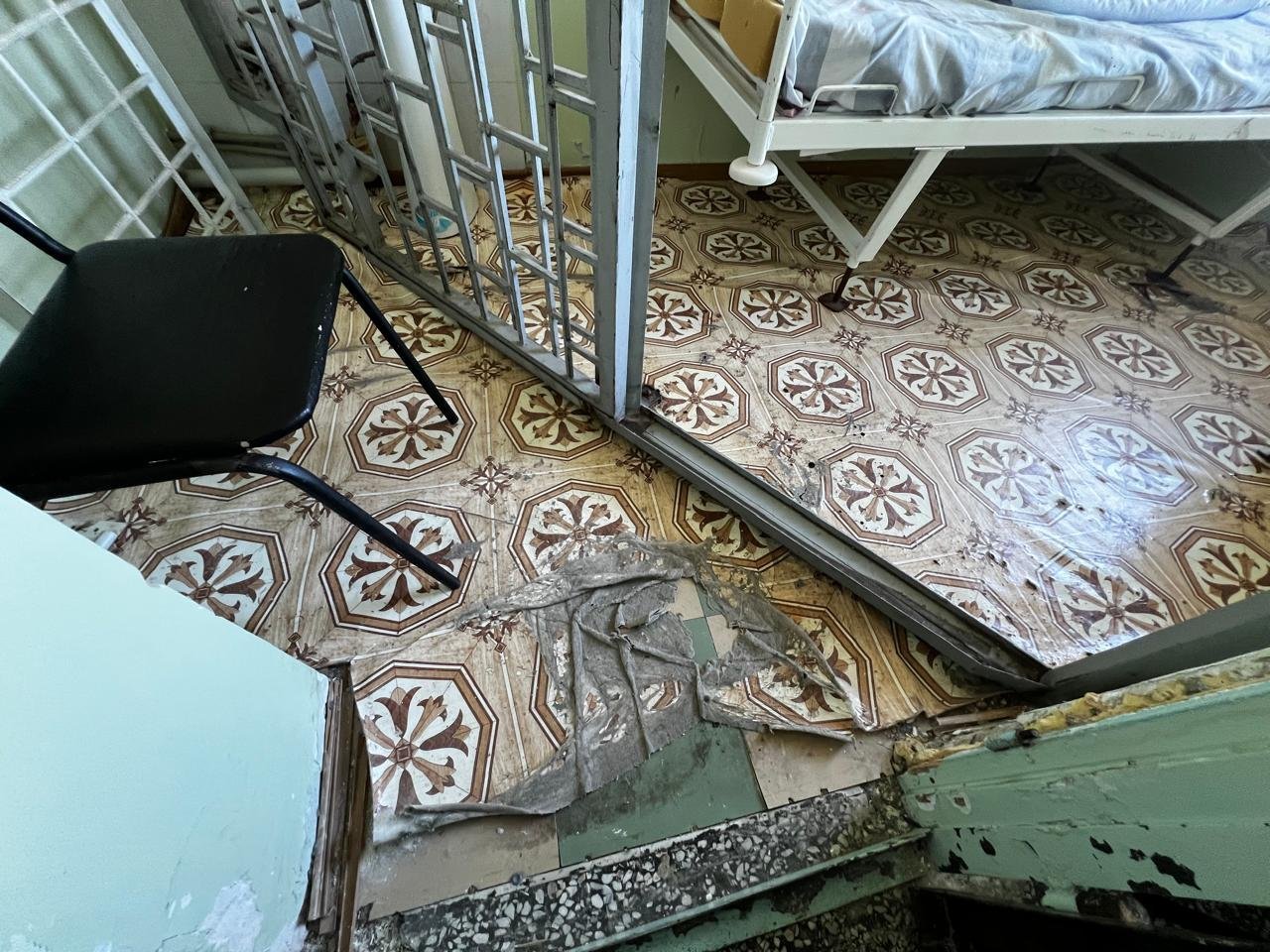
There is also a “service ward” — a private room that looks slightly more comfortable, with just one bed. But there’s no TV or fridge. Usually, regular patients stay there when there are no available beds in surgery.
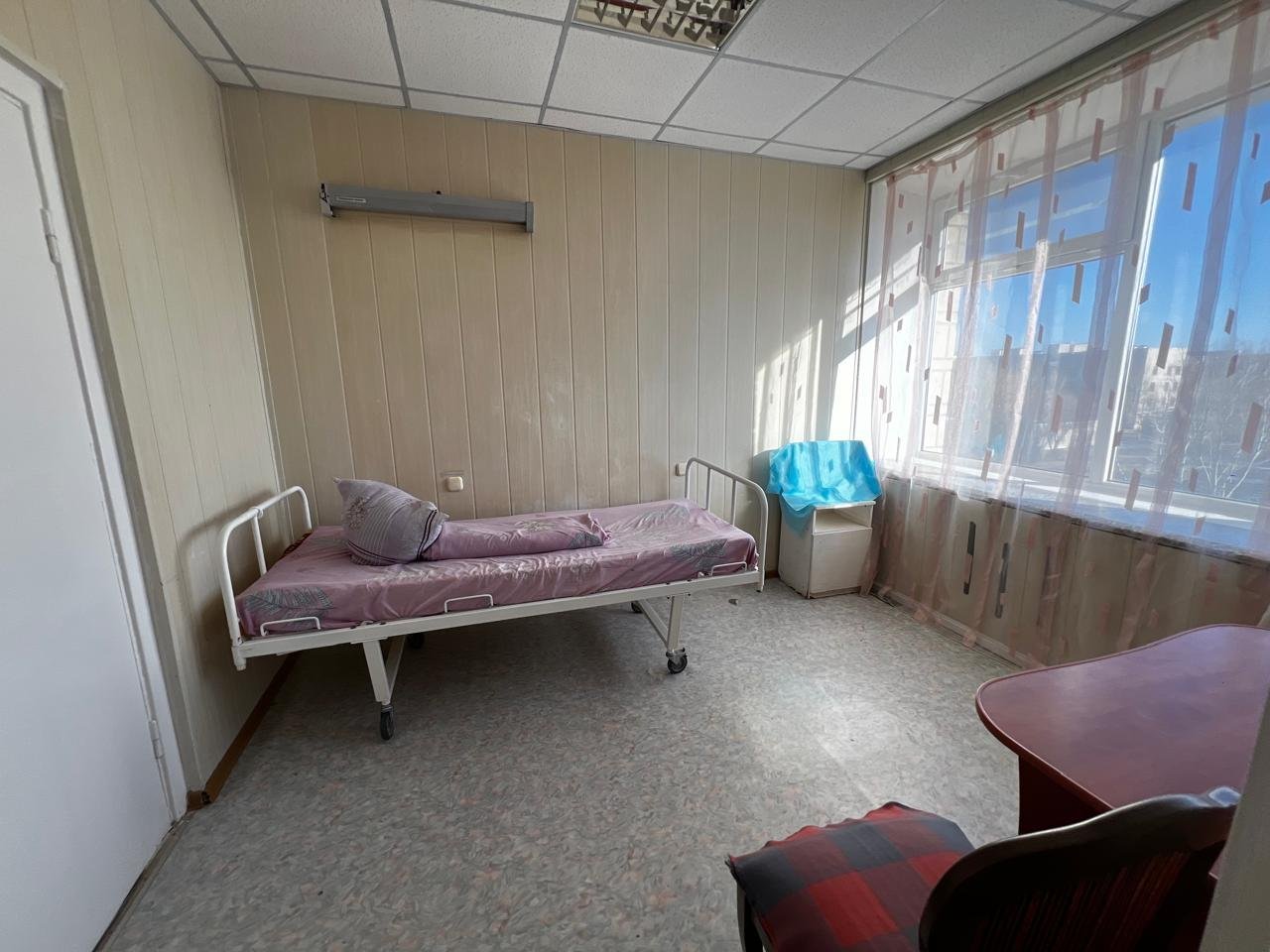
In the bathrooms, cracked toilets lack lids or support rails — a serious risk for post-surgery patients. If someone wants to complain to the Ministry of Health, there’s a wall-mounted phone for that — but it doesn’t work.



In the corridor stands a homemade cart — another example of staff improvisation.
How Surgeons Have Adapted
This is what passes for an “operating block” today:
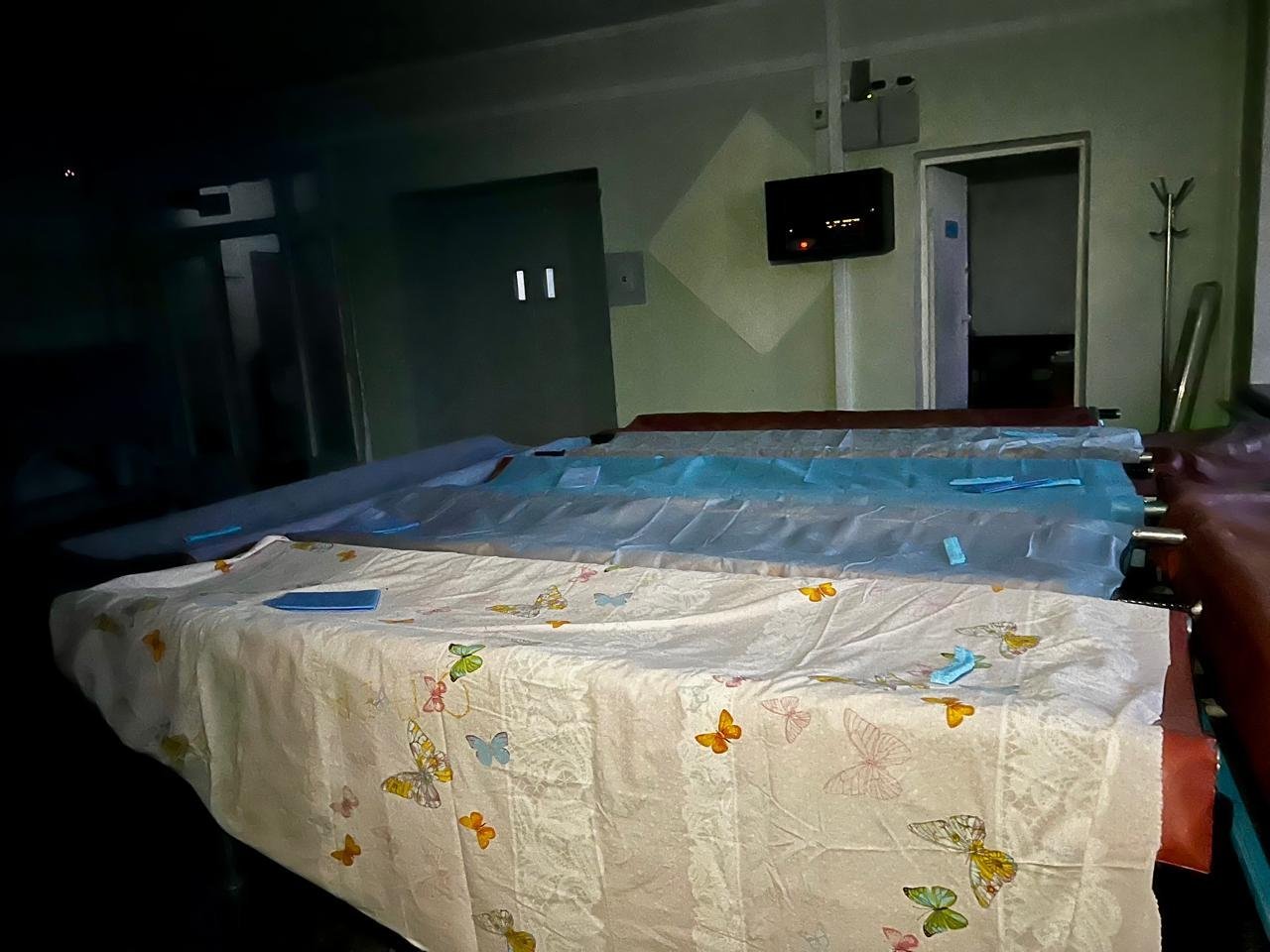
We’re not showing the actual operating room, but the space where patients stay before and after surgery. For almost two years now, doctors at the Stepnogorsk hospital have been performing operations in such conditions.
When they converted ordinary wards into makeshift operating rooms, they could hardly have imagined that the renovation of the real surgical block would drag on for so long.
Patients don’t stay here — they’re brought in, we operate, and once they wake up, they’re taken back to their wards. When we converted the rooms, we tried to meet all the necessary requirements and coordinated everything with the sanitary authorities. There’s a pre-op area, an operating area, and a sterilization section — we made it as close to standard as possible. But this can’t go on forever. A ward isn’t made for surgeries — it can’t be disinfected properly, and there’s too little space. Still, we keep working and don’t turn anyone away. doctors explained
The Operating Block After Renovation
A total of 440 million tenge was allocated for the renovation of the main operating block and intensive care unit, but nearly two years later, the work is only 60–70% complete, according to Chief Medical Officer Bakhtiyar Rakhimov.
The contractor, SK Maksat LTD, has already received more than 250 million tenge. Work has stopped, and they’ve filed a lawsuit claiming we underpaid them,Rakhimov said.
According to him, there are issues with almost every type of work.
The State Architectural and Construction Control Commission came for an inspection — and found numerous violations. The door frames are lower than the standard height — I don’t know if they were trying to save money. According to the design documentation, there should be no gaps between the door and the floor — complete isolation is required. There also shouldn’t be brush seals on the bottom of the doors, as they compromise sterility. The tiles were laid unevenly, with gaps and misalignments that will make it difficult to properly disinfect the surfaces. For an operating room, that’s critical. There are also serious issues with the ventilation system — because it’s not airtight, it could become a source of infection, posing a high risk of contamination,he emphasized.
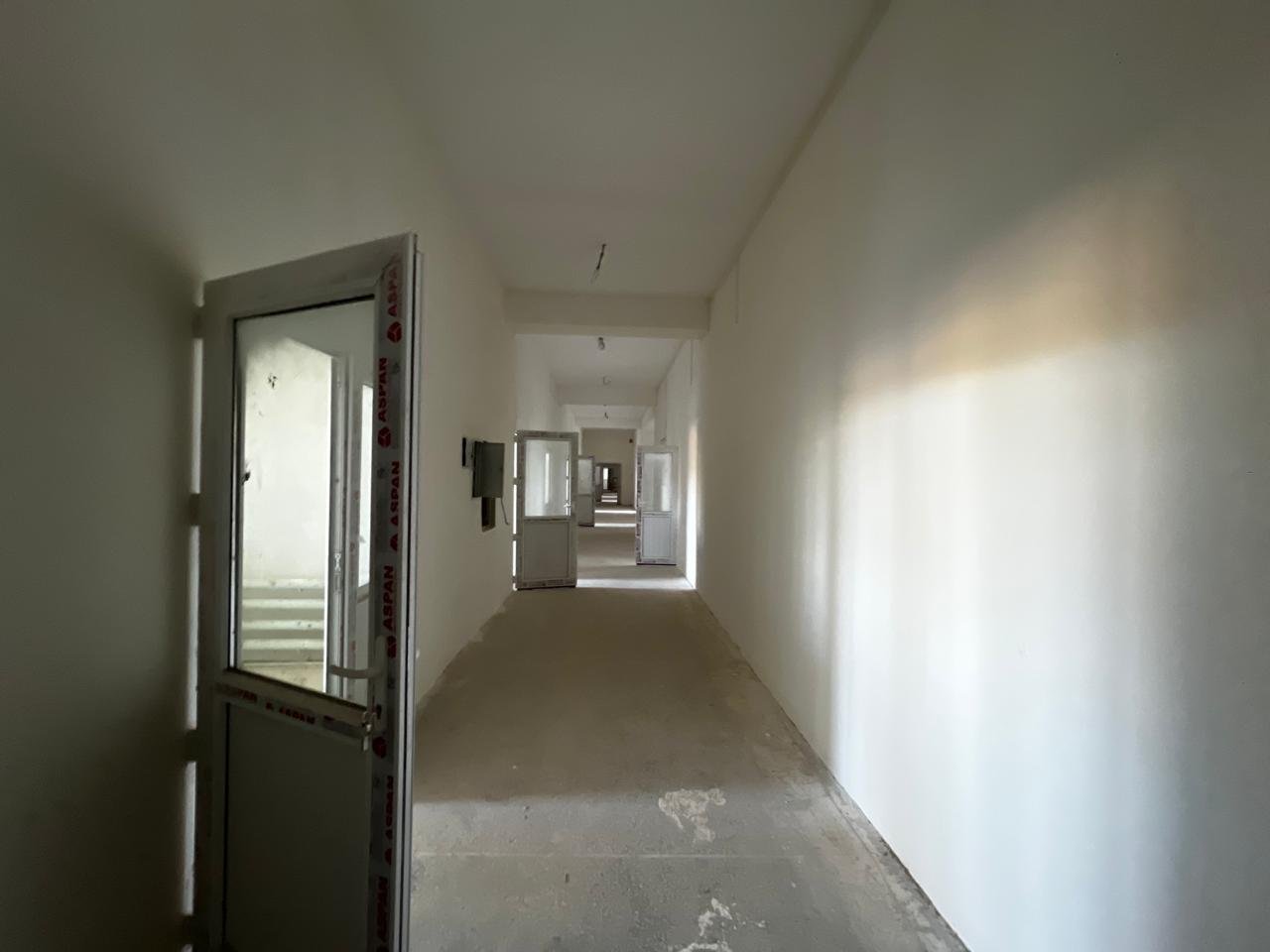
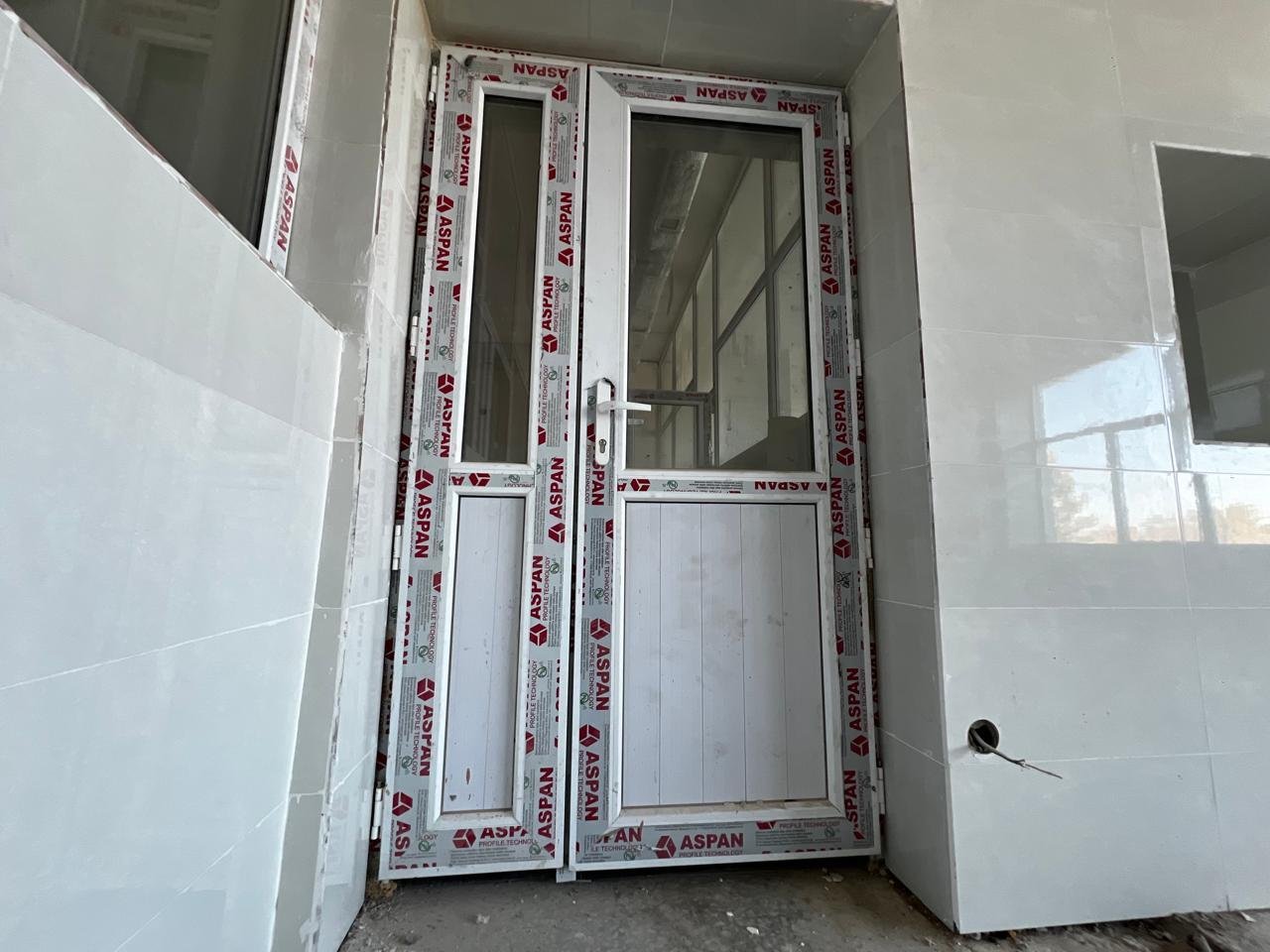
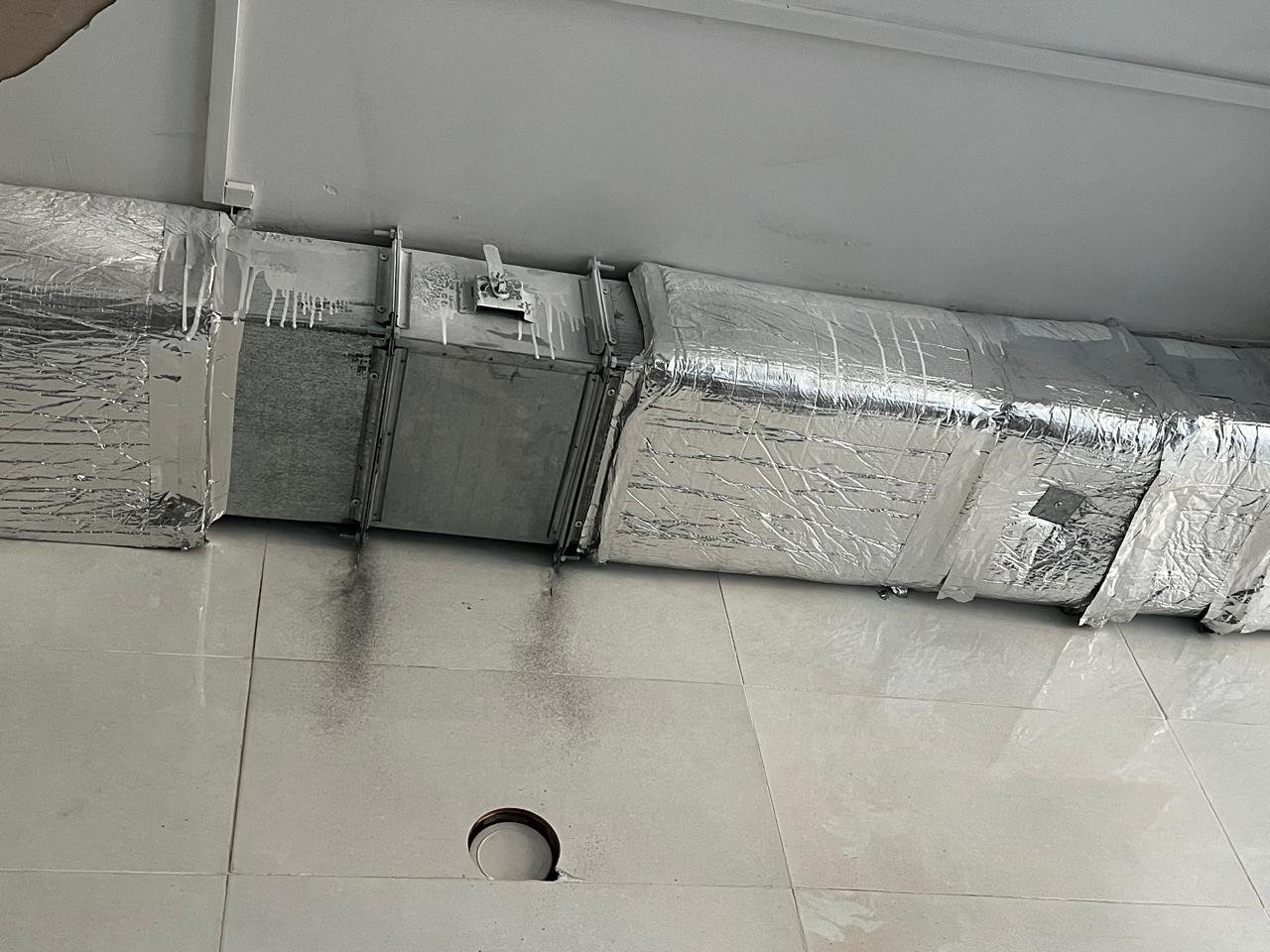
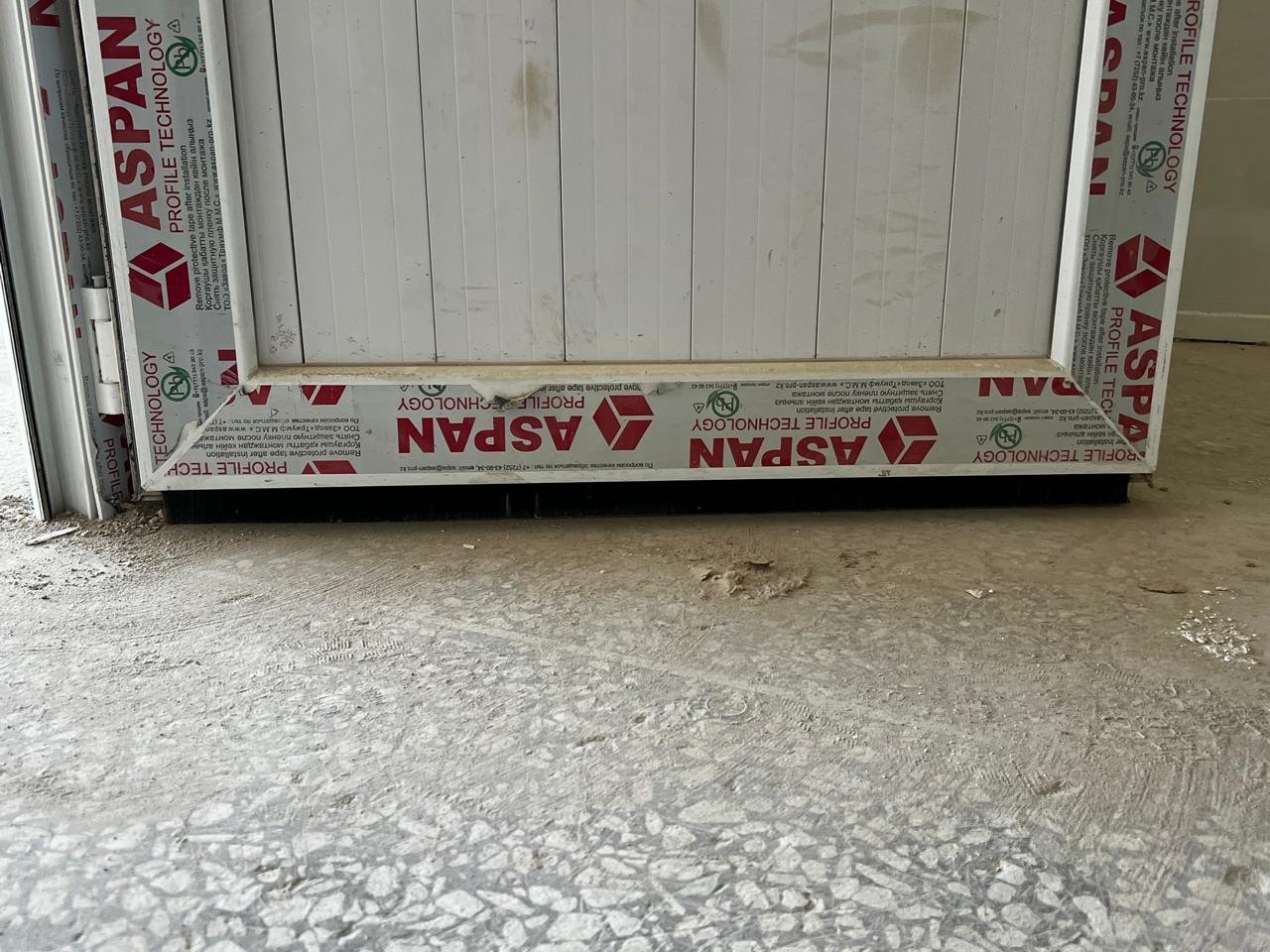
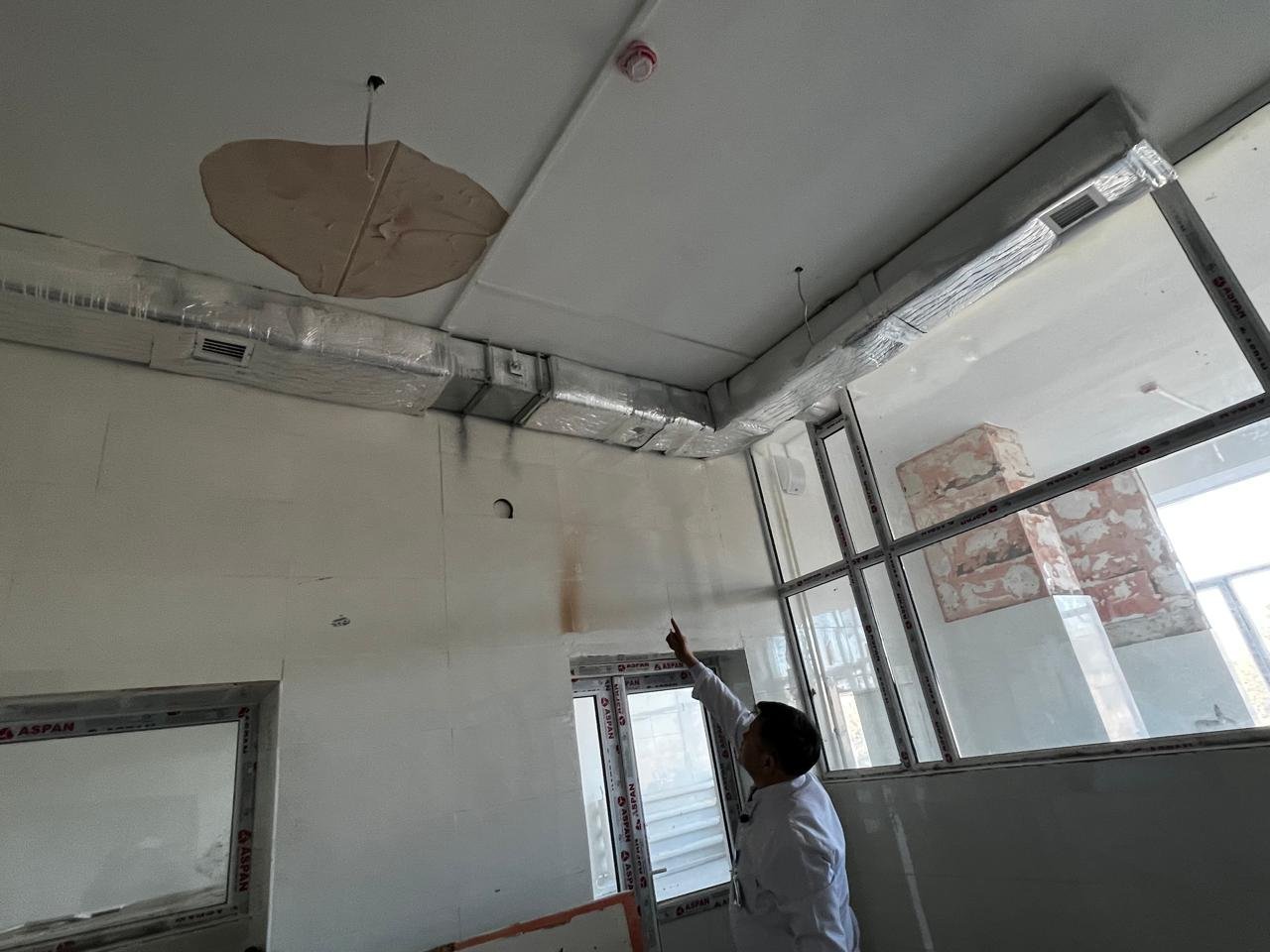
The heating system also raises concerns.
The heating was supposed to be replaced, but it’s still the same — the pipes date back to when the building was constructed, in 1984. Can you imagine? And here, look — as Ravshan and Jamshut would say, ‘We’ll replace it later.’ But how, if the tiles are already laid? said Bakhtiyar Rakhimov in disbelief.
Some of the new windows don’t close tightly and let in drafts, raising concerns about the quality of the materials.
Given how large the windows are, the operating rooms will be cold — the wind will blow right through.
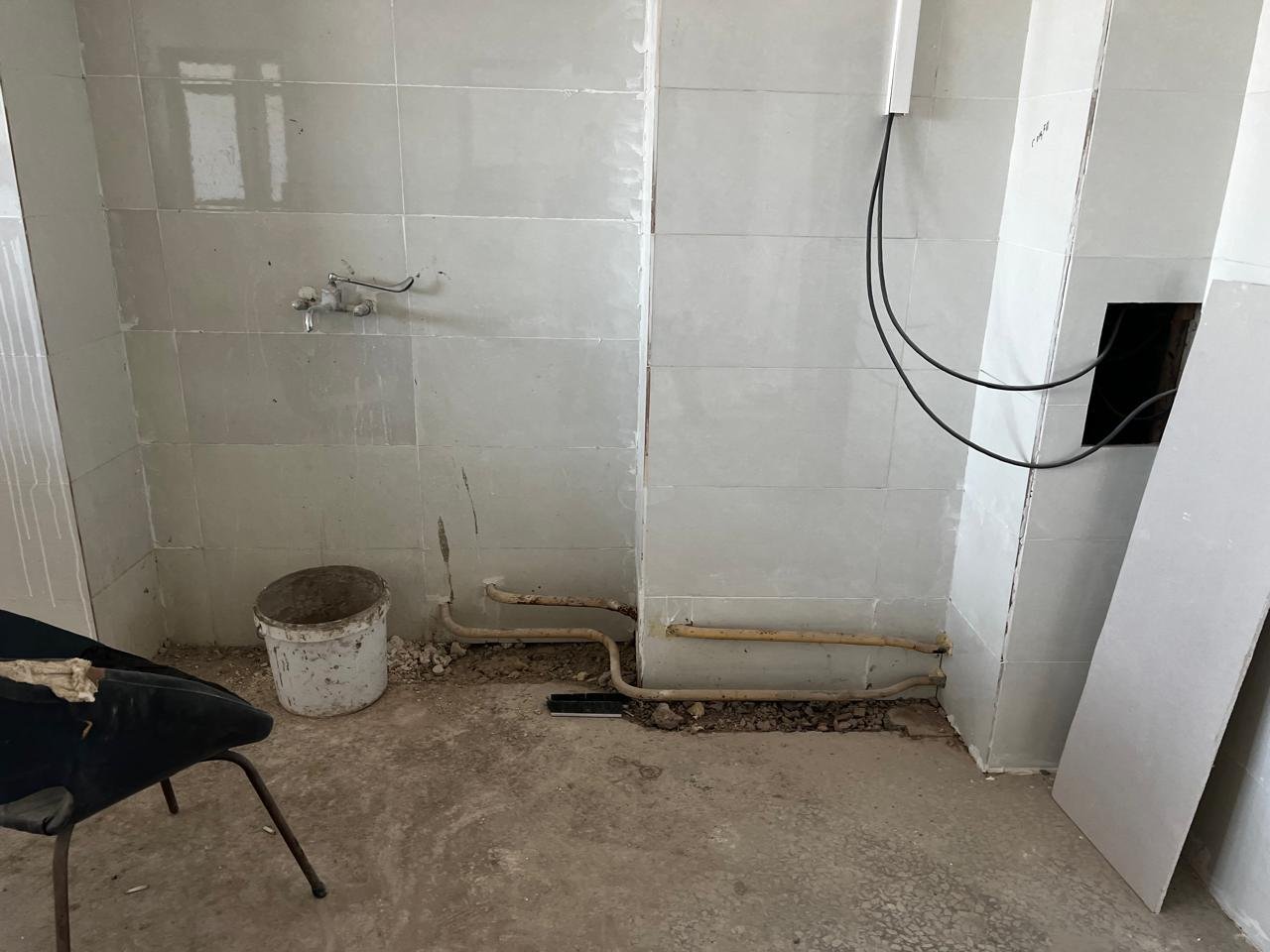
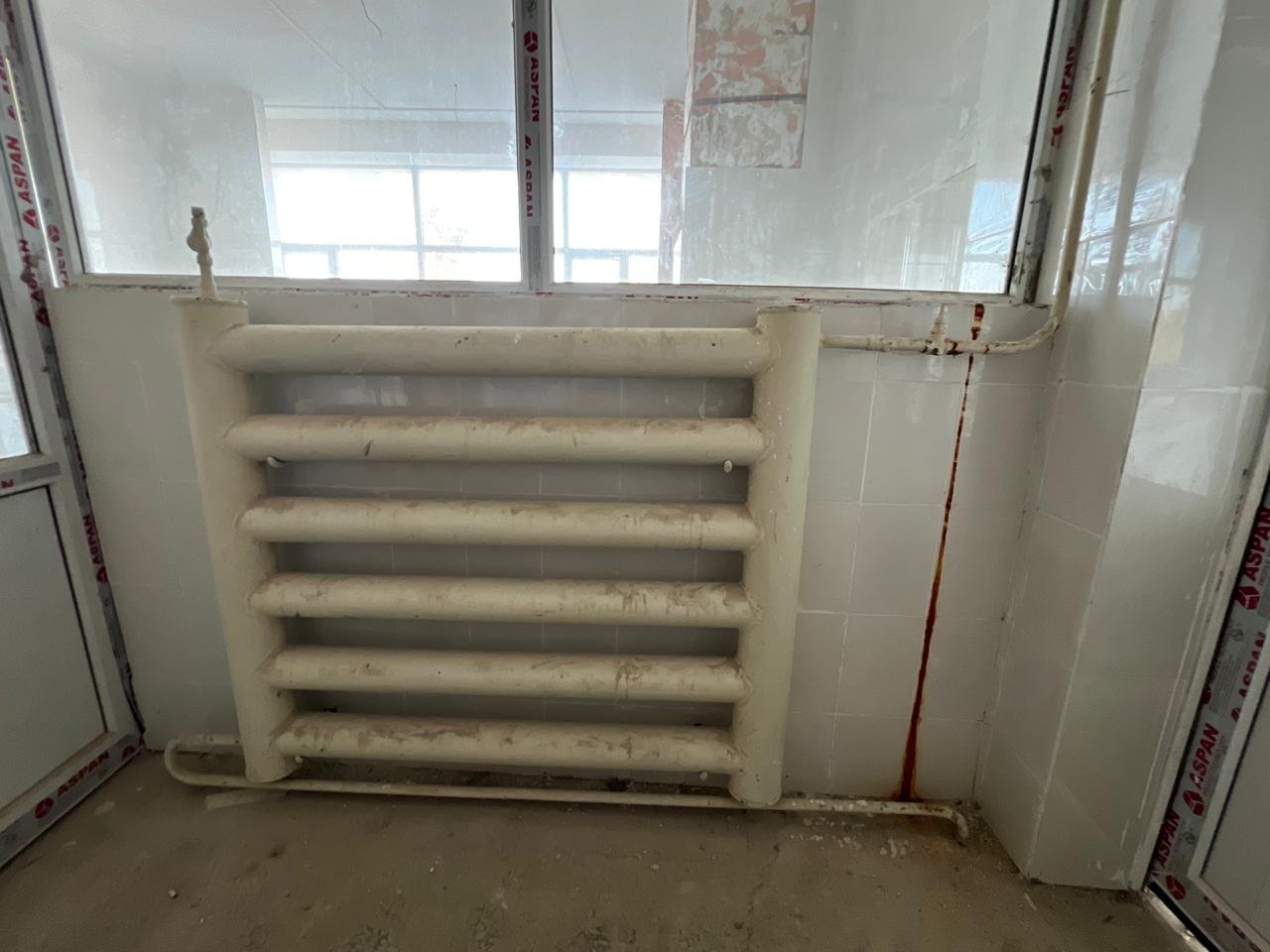
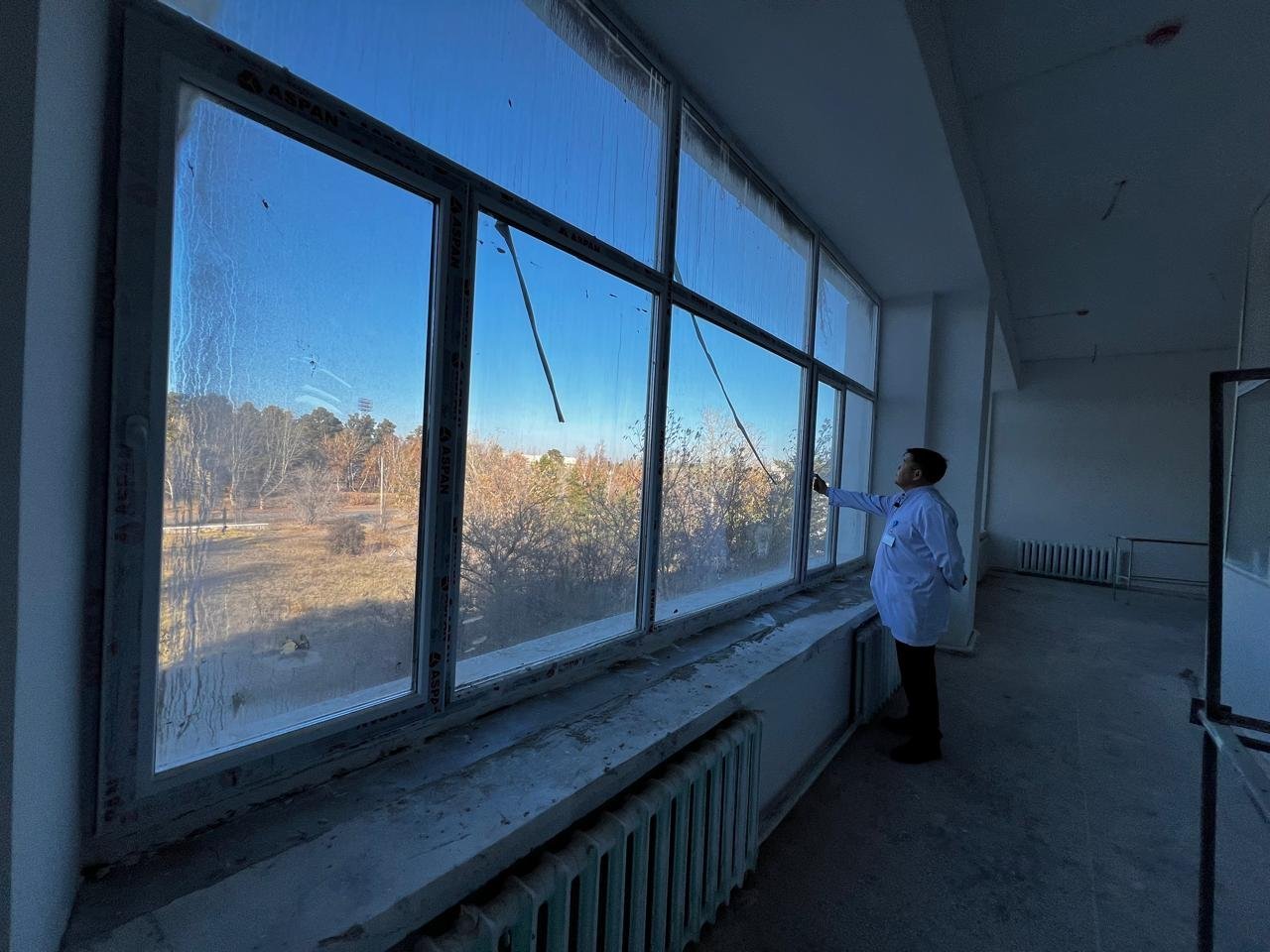
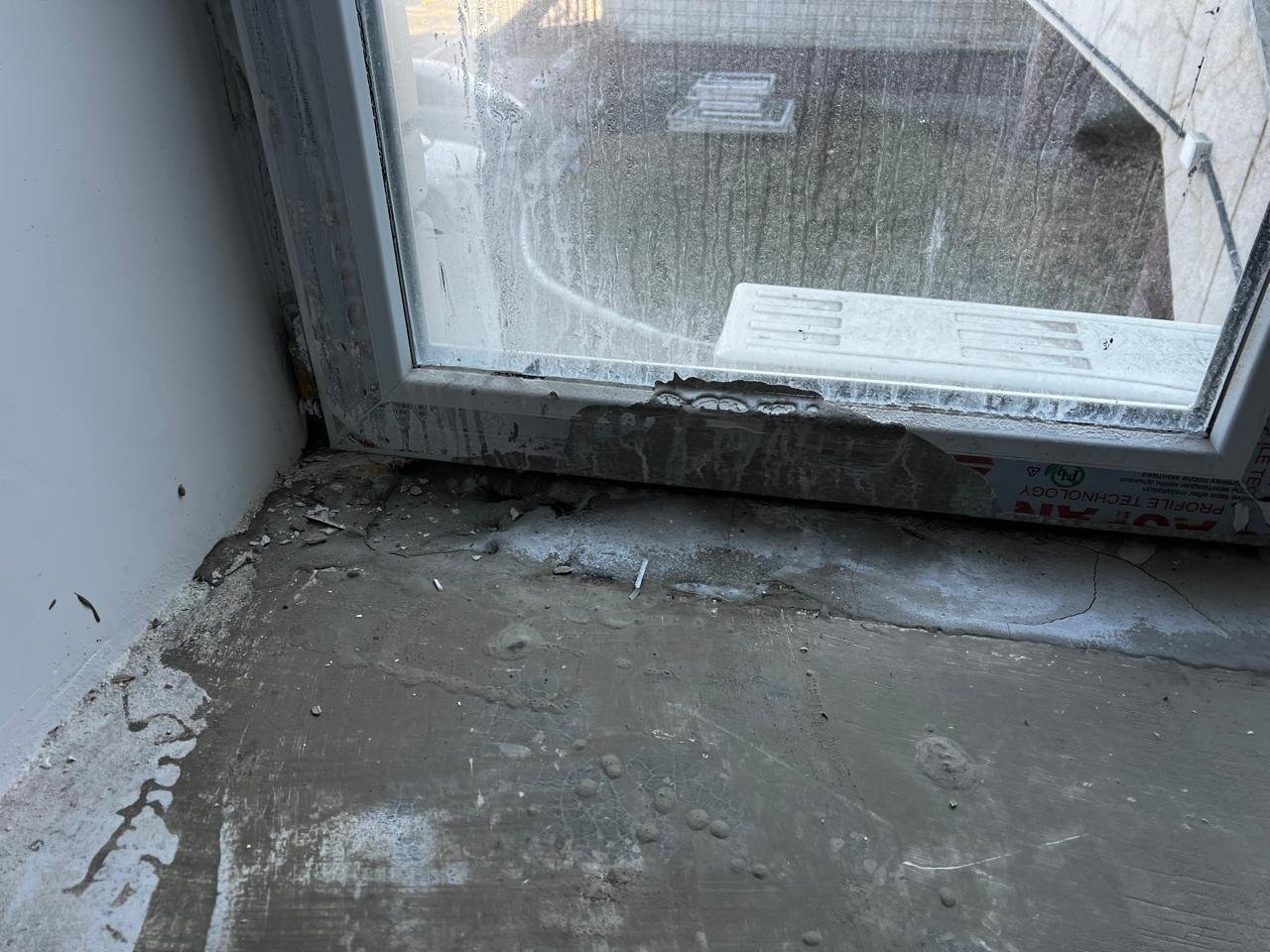
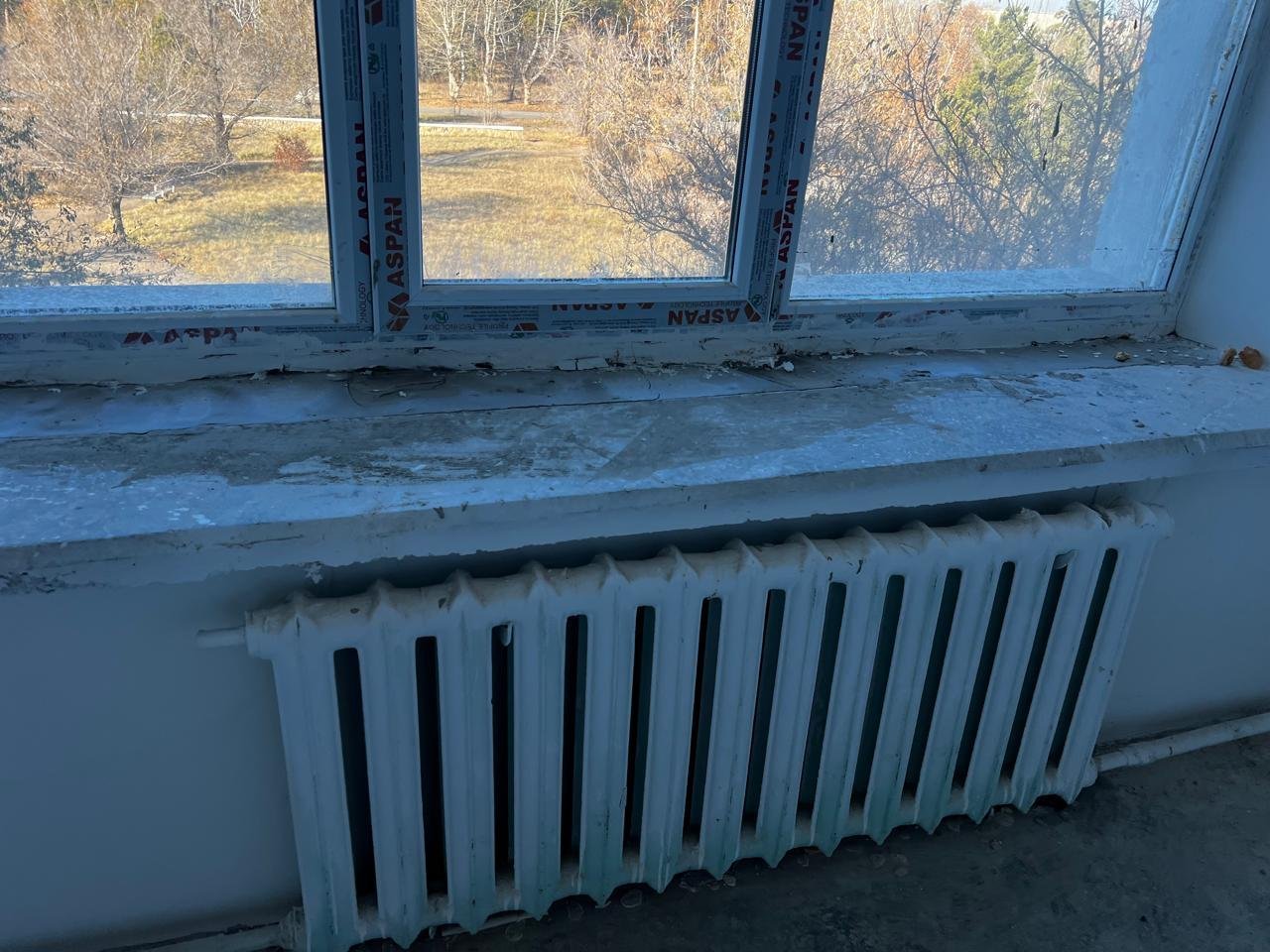
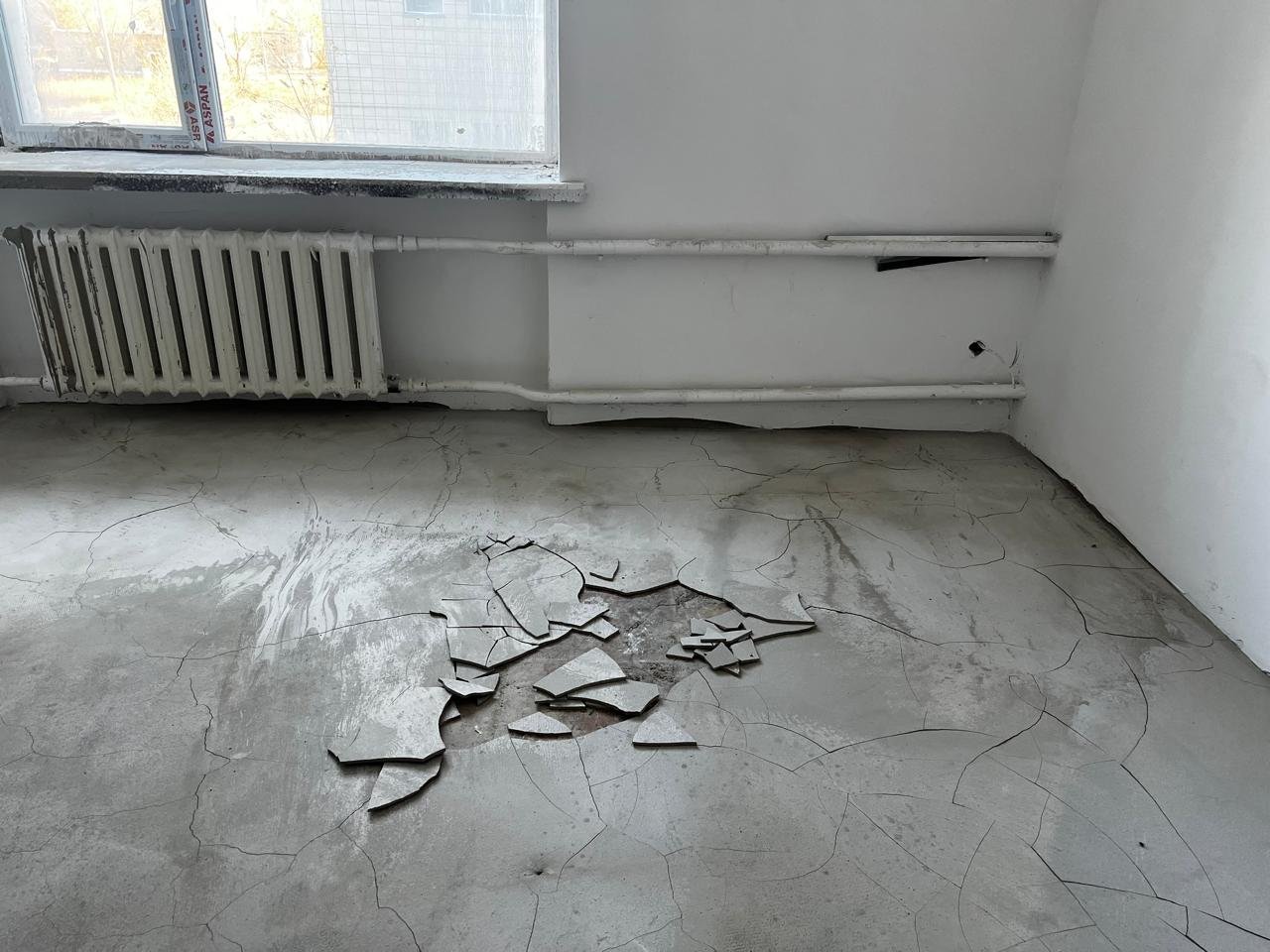
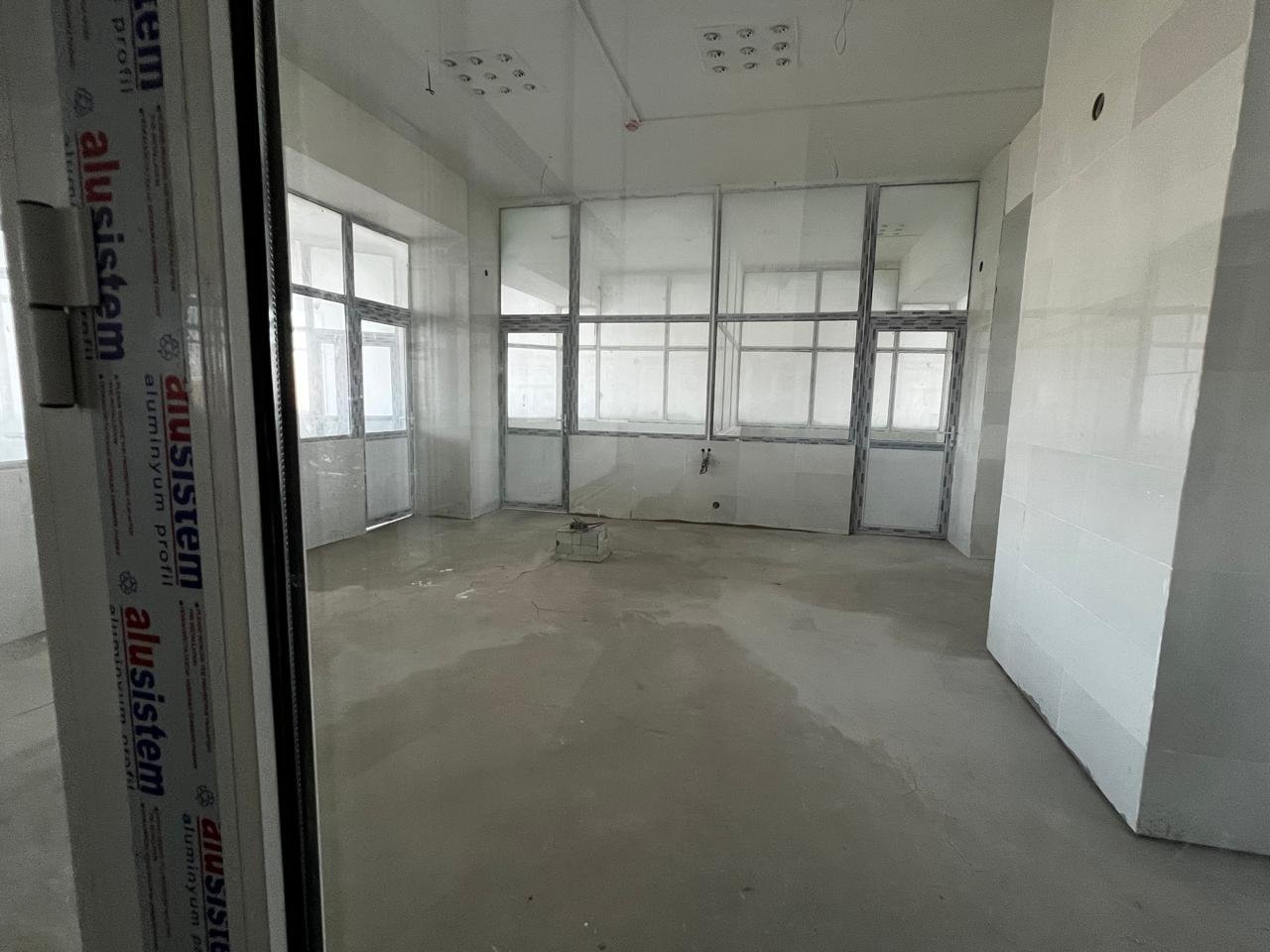
The floors are another issue. According to the hospital’s director, the builders poured the screed over uneven cement — apparently assuming the linoleum would cover everything up.
The same problem exists in the intensive care unit.
The walls are supposed to be painted so they can be properly disinfected, but the builders covered them with some other material, the hospital director said.
He could only lament how carelessly hundreds of millions in public funds were wasted.
You see what solid, well-built spaces we had originally? Just imagine if the contractor had done the job properly and delivered the operating unit on time. The operating room is the heart of a hospital — it’s where we can actually generate income to reinvest in the facility and pay down our huge debts. Right now, it’s like a car without an engine, said Bakhtiyar Rakhimov with frustration.
What the Regional Health Department Promises
Officials in the Aqmola regional health department acknowledge the hospital’s problems.
In 2023, 50 million tenge was allocated from the regional budget for the reconstruction of the operating and intensive care units. In 2024, 229 million came from the government reserve and 29 million from the local budget. This year, 135 million has been allocated from a special state fund. When the new operating and intensive care units will finally start working, unfortunately, we cannot yet say, said Nariman Yermek, head of the regional health department.
Perhaps the problem lies in the appointment of inexperienced managers or weak leadership. Over the past three years alone, the hospital has seen three different chief doctors — yet the problems remain.
There also appears to have been poor oversight from both the regional health department and the hospital itself as the contracting authority. Still, the staff have high hopes for the new director, appointed just a few months ago.
A new contractor has been selected through a tender to begin major renovations in other departments — pediatrics, obstetrics and gynecology, neurology, and surgery, among others. The total allocated amount is about 1.8 billion tenge. The two-year project is expected to be completed in 2026.
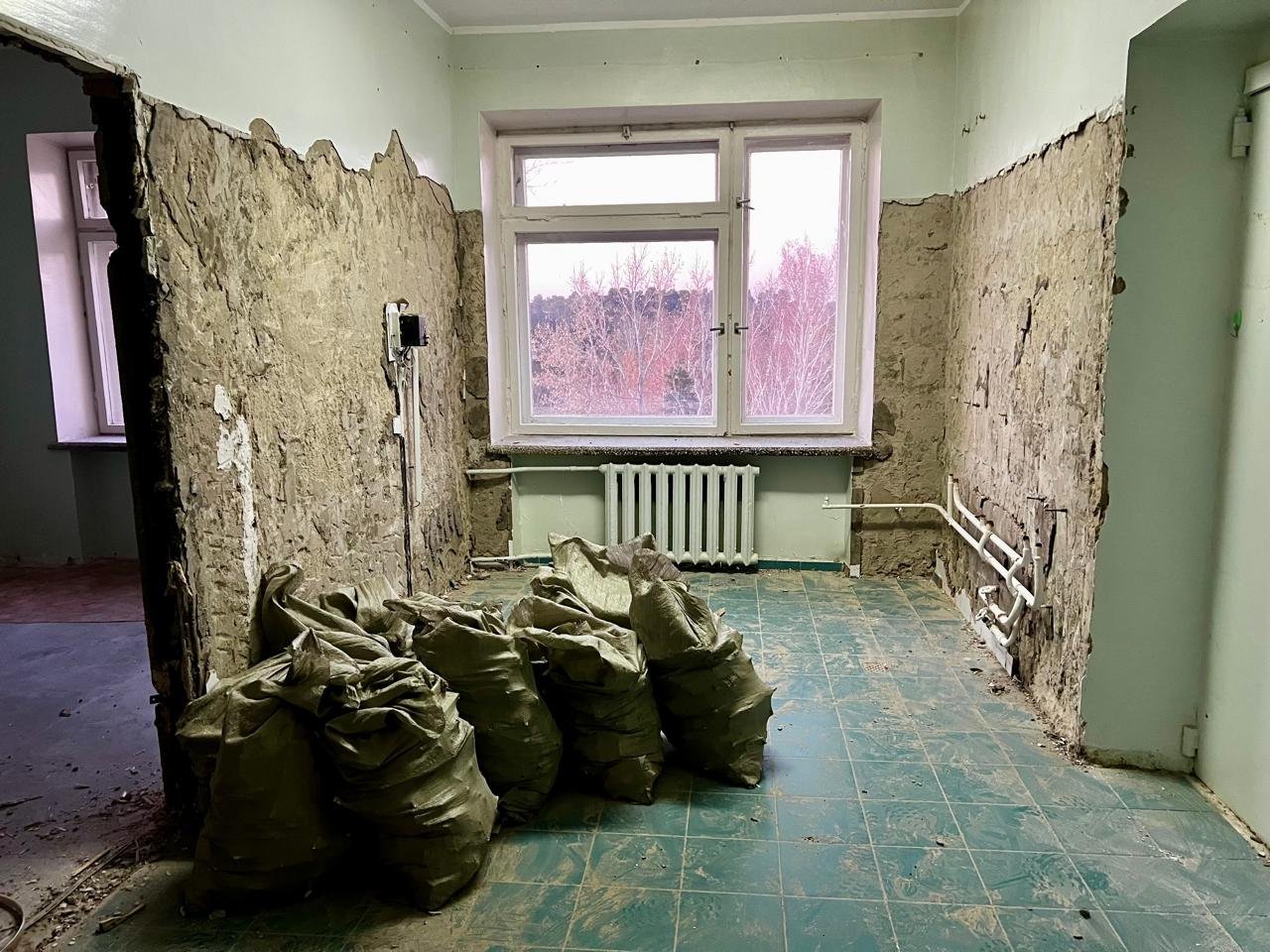
Whether it will be completed on time — or drag on for years like the last one — remains to be seen.
What the Chief Doctor Promises
The hospital’s director also has no shortage of promises — assuring that this time, he’ll personally ensure the contractors do their job properly.
Besides the departments, the cafeteria and the morgue also need urgent repairs — the morgue has practically become a running joke. The design and estimate documentation should arrive this month, and we plan to apply for reconstruction funding next year, said Bakhtiyar Rakhimov.
Since his appointment, the hospital has managed to reduce its debt by 28 million tenge in just three months.
It’s in our best interest to close the debt as soon as possible and start fresh. Most of the expenses go to payroll — in early June, it accounted for about 90%, but we’ve reduced it to 85%, which helped us cover medical insurance and pension contributions. We’ve cleared 1.5 million tenge in social payment arrears. For health insurance, we prioritize payments for those going on maternity or retirement leave. As for incorrect payroll calculations, we’re restoring the accounting software and implementing a new payroll system to ensure fair calculations,Rakhimov said.
Regarding staff training, he added:
At the moment, only one doctor — the one you mentioned — is due for training. We have the funds and made the offer, but he declined because we can’t cover the cost of renting an apartment or hotel. The training budget only includes tuition, travel, and daily allowances. We’ll work out how to handle the accommodation issue properly within the law, Rakhimov said.
Still, as experience shows, promises don’t always translate into action.
Orda.kz continues to monitor the situation at the Stepnogorsk hospital.
Original Author: Assel Turar
Latest news
- Kadyrov Confirms Drone Damage to Grozny City
- Russia Temporarily Blocks Kazakhstan's Grain Transit, Threatening Flax Exports to Europe
- Assets of Businessman Dulat Kozhamzharov Seized Following Halyk Bank Claim
- Georgian Opposition Calls December 6 March Over Alleged Use of Chemicals at 2024 Protests
- Severe Smog Covers Oskemen
- Fire and Structural Damage Reported at Grozny City Tower Amid Drone Threat
- Pashinyan Says Foreign Influence Networks Exposed
- Kazakhstan-Based Lukoil Assets Could End Up in Hungarian Hands
- Strong Tenge Pushes Some Banks to Temporarily Stop Issuing Dollars
- Investigation Links Baimsky Project to Nazarbayev's "Wallet," Vladimir Kim
- Three Kazakhstani Nationals Arrested in Georgia Over Alleged 10,000-Ton Oil Theft
- Turkistan Region Contract for 100 Million Tenge Video Project Triggers Scrutiny
- Gennady Golovkin Becomes First Kazakhstani Honored by the International Boxing Hall of Fame
- Former Majilis Deputy Says She Was Stripped of Mandate After Criticizing Authorities
- Mangystau Authorities Investigate Death of Worker Who Fell Into Elevator Shaft
- Golovkin at World Boxing: How Kazakhstan and Saudi Arabia Are Building a New Power Structure in Boxing
- Taraz: Sentences Extended for Defendants in Group Sexual Assault Case
- Taliban Carry Out Public Qisas Execution After Teenager’s Family Killing
- CITIC Construction Responds to Activist’s Claims Over Almaty–Oskemen Highway Quality
- Kazakhstan Proposes New Law Tightening Control over Anonymous Channels

